#and that white queer people reducing stories that are about a character's struggle with being multiracial
Text
not to wade into discourse about shows online which I swore to stop doing but I think some of you need to recognize that not every piece of media is about you, and that focusing only on the themes that you personally identify with while erasing the ones you don't is Not Great
#some of you only know how to analyze things through a VERY specific queer lens that matches your own personal experiences and it shows#and I just think there is a lot more to enjoying narratives about having a complex relationship to gender in a very specific historical era#than arguing about what specific pronouns and labels they would use in 2023#and that white queer people reducing stories that are about a character's struggle with being multiracial#to *only* the queer elements that we identify with is. not great???#you can't separate these things you can't just ignore them#I'm obviously not equipped to do in-depth *commentary* on that aspect of mizu's character because I am in fact a white queer#that is for other people to speak about and I'm enjoying reading their takes on it#but like. you need to engage with media that is not about you. you need to assign artistic merit beyond what you personally identify with.#you can find things that resonate with you in them but you should not make the whole thing about you
179 notes
·
View notes
Text
XO, Kitty and the start of the queer character evolution.
(Spoilers for XO Kitty Below!)
I’m always one for teen dramas. It’s a guilty pleasure that I take much delight in. Classic rom-coms like 10 Things I Hate About You and Clueless have always been my favourites. But to me, they always felt too straight. Too much heteronormative things and none of the queer rep I always wanted, even in more modern films and TV Shows in the genre.
To All the Boys I’ve Loved Before has always been one of my favourtie movies, so, when I found out about the spin off series XO, Kitty, I was ecstatic. Kitty had always been a character I resonated with and I loved all of Jenny Han’s other work.
Going into it, I expected the classic two boys fighting over one girl love triangle, a gay best friend and the girl best friend that I always seem to ship the main character with. I had predicted most of the story from the start. Until.
XO, Kitty is far from the ‘girl meets boy’ I was familiar with. It’s a queer love story and a coming out story and a self-discovery story. Definitely not the black and white romance i thought it would follow.
We have Q, the GBF, who is far from the feminine male sterotype you see in teen TV. He doesn’t give Kitty fashion advice and makeovers (which isn’t a bad thing btw), but a jock, the atheltic scholarship kid, who sure, does know a good dress when he sees one, but takes on a character that’s still such a worthy queer person without having to fall into the feminine sterotype.
Then we have Yuri, the Korean ‘it’ girl, also the girl best friend. She’s not the bimbo pick me girl you think she might me. She’s complex and interesting and she’s gay. Her storyline is something you don’t see often, and they really delve into the struggles of what it’s like being queer in a place and family where you’re not allowed to. Her journey is beautiful and powerful and reflects the coming out struggle in such an honest way, without making her story as a queer person just about coming out. She says the line ‘I have to live a fake life just so you’ll keep loving me’, when coming out to her mum and that encompassed so much of my current queer experience, especially as a person of colour. I think that it was for me, a sort of ‘Hey! we’re in the same boat’ thing and really made me feel so much more seen. She’s a well developed queer character that isn’t reduced to a ‘placed there just for representation’ character.
And we have Kitty herself. The main character. I honestly did not expect Netflix and the producers to go in this direction, but Kitty is queer. At first, I didn’t know if they were just sorta doing it for the sake of it. It didn’t feel like a deliberate decision. Maybe more of a thought that crosses her mind during the show. But Kitty has a crush on Yuri, and the way they address it is so different. They don’t exactly show that coming out to yourself thought process (which I kind of wish they did), rather, Kitty likes Yuri and she just accepts that, which I think is cool. I like now we don’t always need this big revelation moments (although, they’re still cool), but I think it shows the progression of how we treat queer characters as not spectacles for the audience, but just, people. Kitty’s crush on Yuri also felt very resemblant to my own crush on my friend which was probably why I related to her so much but just in general, it felt so natural to just have a queer main character in a non-queer focused show. Like, this wasn’t Hearstopper. No one expected it to be, yet, here we are, and I’m so happy about that.
This evolution into organically created queer characters is something we defnintely need more of and I’m so glad that Netflix is taking the step to do so. ALTHOUGH I REALLY HOPE THIS IS NOT BECAUSE THEY’RE TRYING TO GET REDEMPTION FOR CANCELLING ALL THE OTHER SAPPHIC SHOWS.
I also feel like though, that Jenny Han is just like a great person because whenever it’s her books being adapted, there’s always this like ‘organic queerness’. Like, in The Summer I Turned Pretty, there’s this guy Jeremiah, who in her book is presented as this straight guy, but in the show he just like kisses some guy and it was a dileberate from of causal representation (if that’s even a thing). Like kissing that guy didn’t add to the plot, but it wasn’t queerbaiting either because (well for me personally) I felt like the directors were like ‘This is Jeremiah. He’s queer, and he’s a main love interest’ and being queer didn’t like shatter the earth around him, it was just a part of him, as it is for all queer people.
But XO, Kitty itself aside from Kitty and Yuri is so good (maybe because I’m a sucker for these things), but everything about it just makes me squeal. I feel like teen TV is taking a turn in terms of creating realistic characters. And while we still have a long way to go (GENDER DIVERSE AND CULTURALLY DIVERSE PEOPLE!!!! CMON NETFLIX), XO, Kitty feels like a really big win for queer (and especially QPOC) people.
#xo kitty#kitty song covey#queer#lgbtq#representation#@netflix#watch xo kitty#its so good#im obsessed#rant
68 notes
·
View notes
Text
The year is 20XX. RWBY is entering its eleventh volume, with a recently-announced anthology spin-off in its concluding episodes. Certain individuals still adamantly believe that the series is dead.
Critics continue to complain about characters who served their role in the plot several volumes prior and is no longer part of the story. Every single such character they complain about is female, queer, and/or PoC.
They continue to invent theories on how every light-skinned man they stan will come back from the dead, including Tyrian Callows, despite having been gradually reduced to sand (which he attempted to eat) on-screen.
The current antagonist is a light-skinned male who consistently refers to every woman around him with abusive, misogynistic language. The critics unquestioningly defend his every action and blame the women he victimizes for his victimization of them, to the effect of "maybe they shouldn't have worn that dress".
The Bumbleby kiss has happened. Critics believe it is part of an arc about portraying Yang as an abusive psycho lesbian and Blake will eventually realize she's being gaslighted into a sapphic relationship, later to be saved by Sun whom she will immediately make love to as his reward.
The main antagonists remain the main antagonists and don't inexplicably stop having storylines.
RT releases a Pride collection with all of the proceeds going to charity. The HTDM donates to Celtic Phoenix, whose rewrite has Roman Torchwick consistently misgendering May Marigold, out of spite.
The HTDM continues to insist that Mercury Black is going to get killed off and denied redemption, all while continuing to whine (with unbashed misogyny and racism) that Emerald Sustrai already got redeemed. This is despite the fact that Mercury has in fact already left Cinder's side and joined the heroes.
Jaune says a single line in one episode. The critics compare Jaune Arc having one line of dialogue in this episode to people dying durig the COVID-19 pandemic.
Eddy sneezes in one of the volume commentaries, prompting the HTDM to start a "Stop Breathing Eddy" challenge. They then act as if they are the victims for being called out on telling one of the show's writers to actually die.
Oscar's arc of struggling with his role as Ozpin's new host versus retaining his own self continues. He stubs his toe in one episode as a minor gag, and the HTDM spends three weeks harassing the female VAs of the show for the "blatant racism" of this.
RWBY's queer rep continues to expand. The HTDM continues to whine about how "unfairly" straight white men who abuse women are depicted in the show.
More spinoff shows and games are released. The critics insist every single one is a colossal failure, which explains why they keep making more of them, huh.
RWBY-Doo has been announced. The FNDM is in jovial debate on what to name the Zwei/Scoob ship. The HTDM is divided between spewing queerphobia about Velma or insisting she's more queer than any character in RWBY (ironically, she ends up hooking up with Ilia in the crossover).
The year is 20XX, and if one thing hasn't changed, it's that RWBY critics maintain their...vivid imagination? Persecution complex? Facade of vitriol and they are in fact deliberately playing a long con to fool historians into thinking that people on the internet really were this stupid?
#i'm not sorry#i *had* to~#rwby#rwby critics#in case it's unclear#this is a parody of something a rwby critic wrote#as if it was perfectly rational and reasonable
46 notes
·
View notes
Text
Common questions about and excuses for racism in fandom
I noticed that the same excuses, justifications, and questions that have come up in response to racism in fandom over the years appear in the notes for my post, so here’s a FAQ of sorts to address them. Hopefully, this will help people understand why these arguments don’t stand up to scrutiny and have something to refer to in lieu of writing a new reply every time someone says these things.
Due to the length of this post, I made a Google doc for easier reading. Please note that several points are specific to the Marvel fandom and to the post linked above and are often M/M-focused (I explain why in that post), but generally speaking, the following can be applied to any fandom and various relationships.
TABLE OF CONTENTS
I can ship whatever I want. Stop being the fandom police!
Shipping isn’t activism.
Fandom is supposed to be fun. Being told what to do or not to do isn’t fun.
I put a lot of different people in my works, and I do research about the groups they’re in. For example, I have a *marginalized group here* character (e.g., disabled), and I did research to represent them accurately. It’s not fair to say that I don’t care about diversity.
I don’t think people should write about POC if they’re white, just like I wouldn’t want anyone to talk about *insert topic you’re passionate about or interest group you’re in here* (e.g., the BDSM community) if they didn’t know anything about it.
I really don’t have any knowledge about what it’s like to be a POC, though, so maybe I’m not the best person for this. If POC want to see themselves represented, they should make their own works.
I’m not comfortable with writing POC as I’m unfamiliar with the struggles they experience. I don’t want my writing to come off as inauthentic, inaccurate, or offensive. Why are you saying it’s harmful to use this as a reason for abstaining from writing POC?
It doesn’t make sense to include every single POC in my work.
What you said and the data you have don’t necessarily point to racism. It might just be individual preference. I prefer certain ships over others, and it has nothing to do with race/I don’t see color.
A big part of what informs my shipping is physical attraction or interest in the characters.
I don’t ship _____ because I see them as brothers/sisters/siblings.
Some white characters and ships are popular in the MCU fandom because people bring in canon characterization or material from the comics to the character(s)/ship. Your MCU-only examination fails to account for ships with one character from the MCU and one from comics (e.g., MCU Bucky/616 Clint or Spideypool).
Some subfandoms just have fewer POC which means there will naturally be fewer ships featuring POC. To say that the Marvel fandom is racist as a whole is disingenuous; you can see how more diversity in the cast leads to more diverse ships in fanworks.
Some of the characters and ships are popular because white characters get the lion’s share of screen time and development or they appeared in canon earlier.
Is it racist to racebend a character?
Racist language in fics is more important than fandom representation.
My fanworks tend to focus on one ship and don’t really include other characters in general. When they do, the others mostly talk about that relationship. Am I falling into the trap you mentioned?
I feel guilty about not including or writing about *character of color’s name here*.
How do I ensure that I don’t offend anyone if I include POC in my work?
What should I do to examine myself for any implicit biases?
The rest of the post is under the cut.
I can ship whatever I want. Stop being the fandom police!
As explicitly stated several times in my post, I agree that you can ship whatever you want. I’m not targeting a specific ship. I’m not telling you to stop shipping what you ship. All I’m asking is for everyone, including myself and other POC, to regularly examine ourselves for any implicit biases. If you’re a multishipper, are all of your ships in the fandom white? If you only have one ship and it’s white, are most or all of your ships in your other/previous fandoms white? Is the only media you consume predominantly or all white?
Shipping isn’t activism.
No, it isn’t and in many cases, shouldn’t be seen or treated as the same thing. However, by responding this way to POC who want to see themselves represented in fanworks more and not be ignored or written stereotypically, you’re telling us that our mere existence is a “political issue.”
Fandom is supposed to be fun. Being told what to do or not to do isn’t fun.
It should be fun for us POC too, and it’s not when we’re consistently misrepresented or we don’t exist in this fandom. By using this as an excuse to exclude POC from your works, you’re saying that only some people are allowed to have fun or that having fun is conditional. Also, no one is forcing you as an individual to do or not do anything. See two paragraphs above.
I put a lot of different people in my works, and I do research about the groups they’re in. For example, I have a *marginalized group here* character (e.g., disabled), and I did research to represent them accurately. It’s not fair to say that I don’t care about diversity.
Just like you do research for those groups, you can easily do research on POC. Also, please be aware that this statement is similar to the “I’m not racist because I have a ___ friend/have a ___ person in my works” argument that many people use to prove they’re not racist, homophobic, sexist, etc. We aren’t interchangeable with other groups.
I don’t think people should write about POC if they’re white, just like I wouldn’t want anyone to talk about *insert topic you’re passionate about or interest group you’re in here* (e.g., the BDSM community) if they didn’t know anything about it.
Something like BDSM is a lifestyle and preference. It is a choice. Being a POC isn’t. We can’t take off our identity every time we leave the house, the way you might keep it secret at work that you’re in the BDSM scene.
I really don’t have any knowledge about what it’s like to be a POC, though, so maybe I’m not the best person for this. If POC want to see themselves represented, they should make their own works.
We do. Also, all of us fanwork creators make works with characters who are different from us all the time. Fandom is largely composed of people who aren’t straight cis men, yet the bulk of works on AO3 features characters who are canonically or implied to be straight cis men even if we end up changing that in our works. Most of us aren’t billionaires, but we don’t have a problem writing Tony. We don’t know what it’s like to be a WWII-soldier-turned-brainwashed-assassin who was kept in cryo for decades except when deployed on missions, but we don’t have a problem writing Bucky. The list goes on.
I’m not comfortable with writing POC as I’m unfamiliar with the struggles they experience. I don’t want my writing to come off as inauthentic, inaccurate, or offensive. Why are you saying it’s harmful to use this as a reason for abstaining from writing POC?
Your concern isn’t harmful. Reducing us to our trauma is, and you’re doing that if the reason you’re not comfortable with writing POC is that you don’t know how to write our struggles. We’re not only our pain. We’re more than that.
Not every fic has to be about the trauma of being a POC. We deserve to have fun, silly fics in addition to serious, plotty drama. We’re not thinking about our suffering 24/7 even if we do think about or are affected by it a lot. It’s not like if you write a Sam/Bucky fic, Sam is going to randomly lecture Bucky about the history of Black people in the U.S. and modern enslavement through the prison industrial complex while Bucky is trailing kisses down his neck in bed. We don’t need everyone being racist to MJ in a Pride and Prejudice AU. If you do want to include their struggles because that informs the way the characters think or act in your story, you can do so in ways that feel organic.
Additionally, this is an excuse that we hear often; you may have heard it as people in Hollywood have used it to explain why they don’t have any, or at least any major, characters from marginalized groups in their works. If we allowed this excuse, an overwhelming majority of who we see in the media would be straight, cis white men considering who has power in the film and TV industry—and we would have to say that’s okay. We would have to say that the only people allowed to write about a certain group are members of that group, e.g., only women can write women. That’s not acceptable especially considering the gatekeeping, oppression, and high barriers to entry and success that make it difficult for marginalized people to even be in the room let alone make a name for themselves.
Fandom is no different. You’re saying that you can’t relate to POC because you’re white, but none of us POC have any problems making fanworks with white characters even though we don’t know what it’s like to be white. There are straight women who write fics about gay men and don’t feel uncomfortable doing so when they don’t know a single thing about being a gay man and the struggles of gay men (M/M can include bi or pan men, fics about gay men by straight women can sometimes include problematic portrayals, and straight men, queer women, and non-binary people write M/M too, but this is just an example).
You should be more careful when writing a POC if you're not a POC. The same goes for men writing women, cis people writing trans people, straight people writing queer people, able-bodied people writing disabled people, etc. However, there ARE ways to go about it, and while I understand the fear of messing up, the truth is everyone is racist, sexist, etc. Everyone including people in marginalized groups. Being a white lesbian doesn’t mean you can’t be racist. Being an Asian man doesn’t mean you can’t be sexist. You can see that within groups themselves. POC are not exempt from racism against other POC or from internalized racism against themselves or their own group. Women aren't free from internalized misogyny. The best we can do is to not make that prevent us from making inclusive works; if you make a mistake, which may happen, all we can ask is that you try your best to be open to feedback and grow.
It doesn’t make sense to include every single POC in my work.
No one is telling you to. Choose characters who make sense for the story. Don’t choose them just so you have a POC in your work. We don’t want them to be tokenized.
What you said and the data you have don’t necessarily point to racism. It might just be individual preference. I prefer certain ships over others, and it has nothing to do with race/I don’t see color.
This argument is identical to the “not all _____” rebuttal (“not all men,” “not all white people,” etc.) which places the blame on a few lone individuals and shifts the conversation away from an existing widespread problem. When there’s a consistent pattern and there are many examples of it both within the fandom and in other fandoms, it no longer is about individual preference.
I urge you to consider the following:
If most people say they don’t write about or include a POC in their work because it’s too difficult or they’re afraid of making that character inauthentic, but they don’t seem to have an issue with writing other characters from groups they’re not in (e.g., if you’re a straight woman who writes a lot of M/M fics despite not knowing what it’s like to be a bi, pan, or gay man), doesn’t that say something?
If most people have the same reasons you do about not being interested in POC (e.g., “they’re not fleshed out enough” while being interested in or fleshing out minor white characters who get the same or even less development as those characters) or ships with POC (e.g., saying “they’re like brothers” while being interested in a white ship with similar dynamics and tropes or seeing why other people might ship it if you don’t), doesn’t that say something?
If most people give characters of color the same roles in their works even if that makes them OOC and/or the role reduces them to a (frequently stereotypical) trope, especially if they’re never fleshed out beyond that trope (e.g., the funny sidekick, wise friend who always helps or gives advice/free therapy, or responsible, mature, and sometimes stern friend who “parents” the protagonist), isn’t that saying something?
If race truly isn’t a factor for you when it comes to liking characters and ships, then this isn’t about you and you don’t have to distract people from the conversation by announcing that. That said, we should all look at characters and ships we like anyway instead of assuming that’s the case as that’s good practice. How much of your list is white? If it’s mostly or entirely white, why is that the case and why do you feel differently about ships of color?
A big part of what informs my shipping is physical attraction or interest in the characters.
What characters and actors do you find attractive or interesting? Are they all or mostly white? If they aren’t, are you drawn to any ships that include those POC? Refer to the section above.
I don’t ship _____ because I see them as brothers/sisters/siblings.
Part of this is preference as it comes down to perceived chemistry and relationship dynamics. However, POC are often not seen as romantic leads both in fanworks and the media and are just friends or “brothers/sisters” (this is why Crazy Rich Asians was a big deal). Sometimes, people even argue against POC being or having love interests in the name of diversity. You see this a lot with WOC in the media where the explanation against a love interest is “she’s a strong, independent woman who doesn’t need a man”; yes, they don’t and sometimes the story doesn’t need a romance, but WOC deserve love too and it’s strange that while white women can get the guy and be independent, WOC can’t and it somehow belittles or reduces them if they do.
The way you can gauge whether it’s just preference at play or biases you may not have been aware of is to see how many relationships featuring a character of color fall under the “just friends/siblings” category for you, what you need to ship something, and how you feel about white ships with the same type of relationship or same lack of chemistry. For instance, you may say that there needs to be enough interaction for you to ship something and that’s why you don’t care much for Rhodey/Sam. Do you feel the same way about Clint/Coulson then, which has much less interaction (actually much less than Rhodey/Sam in this case)? If it’s about chemistry, are Steve and Sam just “brothers,” but Bruce and Thor aren’t or, if you don’t ship Bruce/Thor, you still “see it” and get why other people might be into it?
What do you ship, or what ships do you understand even if they’re not for you, and how is that different from ships that follow the same beats? Why are Steve and Bucky not brothers, but Rhodey and Tony are (there are many parallels between the two relationships—and one can argue the latter is more nuanced—than appears at first glance, and Rhodey/Tony can be just as sweet or angsty)? If you like the rivals/enemies-to-lovers or meet-ugly aspect to Steve/Tony, Sam/Bucky, Scott/Jimmy Woo, and M’Baku/T’Challa have that dynamic. You like that superior/subordinate-to-lovers dynamic that Clint/Coulson has? Coulson/Fury. Flirty meet-cutes or love/trust-at-first-sight? Steve/Sam.
Some white characters and ships are popular in the MCU fandom because people bring in canon characterization or material from the comics to the character(s)/ship. Your MCU-only examination fails to account for ships with one character from the MCU and one from comics (e.g., MCU Bucky/616 Clint or Spideypool).
I explained why I focused on the MCU here and that most of the fics that feature an MCU character and comics ’verse character tend to be heavily or entirely MCU-influenced here.
Also, characters of color exist in the comics, cartoons, and games too. By this logic, Steve/Sam and Rhodey/Tony should be juggernauts in the MCU fandom considering the depth and history of the characters and relationships. Ask yourself why people are happy to ship MCU Spideypool, to draw on the comics for that relationship and even bring a non-MCU character into the MCU and write him based on his comics history and characterization. Ask yourself why people are unhappy with MCU Clint’s terrible writing and lack of characterization and decide to give him his 616 (usually Fraction-era) characterization. And then ask yourself why people don’t do that for characters of color and then use “___ is a minor character/doesn’t have much development” as an excuse for why they’re uninteresting or not shippable with others.
There are many strong and interesting relationships in the comics, but only a few make it to the MCU fandom and almost all, if not all, of them are white.
Some subfandoms just have fewer POC which means there will naturally be fewer ships featuring POC. To say that the Marvel fandom is racist as a whole is disingenuous; you can see how more diversity in the cast leads to more diverse ships in fanworks.
It’s more important to see how many fanworks there are for ships of color in a fandom than how many ships of color there are in that fandom. See how few works there are for POC ships other than MJ/Peter in the MCU Spider-Man fandom despite the diversity of the cast. See how the most popular ships are white and three of them involve white characters from the Iron Man fandom (explain to me how Harley/Peter has over 1,000 works, but Ned/Peter has 436).
And sure, you can say almost all of the Black Panther ships feature a character of color so there’s “more” diversity, but see how few works there are for them and how works with a white character fare compare to POC-only ships (almost all have 100-200 or fewer fics, with many having so few that I didn’t include them in the post, while BP ships with a white character have more works despite little to no interaction between the characters).
Both of these, by the way, are critical and box office hits with characters who are clearly supposed to be the faces of the MCU now that the OG6 are gone. Black Panther is an award-winning critical and box office hit, and it is, more than any other film in MCU history, a huge cultural phenomenon with tremendous impact. It broke so many records and milestones, and it’s STILL breaking and making them. It has the most nuanced and balanced ensemble cast with side characters just as three-dimensional as the lead, a rarity in MCU films. Yet, its tag only has 3,966 works, fewer in total for the whole fandom than some of the white M/M ships on this list. Even if you account for BP fanworks that may have been tagged as MCU instead of BP, the number is paltry as you can see in this post. People simply do not want to make fanworks for characters of color (in this case, specifically Black characters) and don’t. It’s not about how diverse or successful a film is.
Some of the characters and ships are popular because white characters get the lion’s share of screen time and development or they appeared in canon earlier.
Yes, that’s true, but fandom has no problem catapulting white ships with minor characters into extreme popularity. See Clint/Coulson. See fics prioritizing Happy and having him show up more than Rhodey in Steve/Tony fics.
It’s not about chronology. Many ships of color came before white ships as a whole and before white ships with the same white character they have. See Bucky/Clint vs. Bucky/Sam.
Lastly, please don’t tell me how certain white M/M ships came to be to explain how they’re exempt or how I’m failing to consider other factors for their popularity. I’ve been in the fandom since 2012, and I’ve seen almost all of the white ships in the fandom be born or boom into popularity. Don’t try to explain, for instance, that Clint/Coulson is big because Coulson has his own show and his fans followed him from the show (this logic falls flat when you look at something like Luke Cage); that ship became huge way before that happened and way before Agents of Shield became “big.” Also, see the section above regarding screen time, development, and fame.
Is it racist to racebend a character?
People’s opinions differ on racebending—and often that comes from personal background and on the situation—so I can’t speak on anyone’s behalf. However, I think everyone can agree on the following:
Racebending a white character is not the same thing as whitewashing a POC. For example, making Tony Stark Indian vs. turning T’Challa white or as canonical examples, making Fury black in Ultimates and the MCU vs. making the Ancient One or the Maximoffs white. The latter (whitewashing T’Challa, the Ancient One, and the Maximoff twins) is racist for various reasons. There’s a long history of POC being erased and white people taking roles from POC, a huge imbalance in representation between white people and POC, the unfortunate perception by the public and media that “white = neutral/standard” (Bruce’s whiteness doesn’t define his characterization and development), and the way race plays a role in influencing the way POC feel, act, and are treated.
Racebending a POC from one ethnicity or racial group to another is also problematic as we’re not interchangeable. Hollywood often does this and goes, “But they’re still a POC! We’re being diverse!”
In general, people who racebend white characters to POC want to see more POC in canon and in the media! These aren’t mutually exclusive.
Sometimes people racebend because they’re not represented at all in their works. (This happens with other marginalized groups too; for instance, some people make cis characters trans in their fanworks as there are few to no trans characters in the canonical source.) For example, there are, as of now, no Latinx superheroes in the MCU films. Even if people wanted to, they can’t make works with an MCU Latinx superhero unless they bring one from the comics or the one Latinx superhero from Agents of Shield (if they know the comics or AoS), make a minor Latinx film character like Luis a superhero, or racebend their favorite white character and put a fresh spin on the character, drawing from their personal experience and background.
There’s a massive difference between fans racebending a character and a creator taking credit by pretending they viewed a character as non-white or didn’t see race all along when it’s clear that the character is canonically white (this is different from a creator saying they support anyone, POC or white, playing that character onscreen or onstage).
Racist language in fics is more important than fandom representation.
We don’t have to pick our battles. Both are important! I focused on fandom representation as it’s much more quantifiable and easy to find and analyze data for than racist language on a fandom-wide scale on my own without any tools. You’re right that the latter is a problem as is racist representation in fanworks, though.
My fanworks tend to focus on one ship and don’t really include other characters in general. When they do, the others mostly talk about that relationship. Am I falling into the trap you mentioned?
If the story is about a relationship (examining that relationship and the feelings of the characters in it) and there isn’t much of a plot outside of that, then that makes sense. However, even in situations like this, consider how much time you dedicate to characters of color vs. white characters. If the story is about a ship featuring a POC, do you spend more time on the white character of that relationship? Their white friends and how they feel about that relationship? If it’s about a white ship, do white side characters appear more than side characters of color even if the latter have a closer relationship with the protagonists? For example, does Wanda show up more than Sam or play a bigger role than him in a Steve/Bucky fic? Do you have Pepper show up all the time (or even Happy), but Rhodey is chronically absent? Do only the white characters get to be more than the tropes you’re using, if you’re using any, while the POC don’t get to be nuanced? Are there any stereotypes that you’re reducing the POC to?
I feel guilty about not including or writing about *character of color’s name here*.
See “It doesn’t make sense to include every single POC in my work.” Include the character(s) who make sense for the story, perspective you’re writing/drawing from if applicable, and central group or ship if this is a ship-specific work. For example, if you’re drawing the Avengers and you include the newer Avengers, Rhodey and Sam should appear too, not just Wanda, Scott, Bucky, and/or Carol (this happens a lot). If you’re writing a Tony POV fic that includes other characters, depending on the story, it may make sense that Sam doesn’t appear much as he and Tony aren’t close whereas he would in a Steve POV fic.
How do I ensure that I don’t offend anyone if I include POC in my work?
You can’t ensure anything as POC aren’t a monolith, but you can try to be as informed as possible and avoid common pitfalls while writing. You can do research, just the way you might research anything you’re not familiar with. You can ask if anyone is willing to do a sensitivity read while you write or before you post. You can look for betas. There are a lot of resources out there, but these are good places to start if you’re looking for more information and help:
Writing with Color - resources
Writing with Color - Stereotypes and Tropes page
Reference for Writers - POC tag
What should I do to examine myself for any implicit biases?
We should all take stock of:
our feelings about different characters and relationships, both platonic and romantic, who we prioritize in our works, and how much they’re prioritized
our decision whether or not to seek or make content with characters of color. This includes content for white ships because sometimes every white character in the MCU shows up as a side character, but characters of color don’t or all of the white characters play bigger roles than the POC despite how close they are to the protagonist(s)
the way we interpret and write/draw those characters. For example, is Sam a yes-man? A figurative or literal therapist for white friends? The bro who only cracks jokes and/or gives sage advice but seems to not have any flaws, struggles, or life of his own outside of his white friends? The BFF who thinks his white best friend is being ridiculous about another white guy and wants them to get their act together already? Does the character of color talk in the way you perceive everyone of that race to talk rather than the way they personally do (e.g., does Luis randomly and awkwardly switch into Spanish when he talks just because he’s Latinx despite never speaking Spanish with Scott? Does Sam use AAVE with Steve, Bucky, and Natasha when he doesn’t do that with them?)?
Also, here’s a Google doc with more anti-racist resources.
Even well-meaning people can slip up or not be as proactive as they hoped they would be so it’s just good practice to check in with ourselves every once in a while and see if there’s anything we missed or didn’t notice.
708 notes
·
View notes
Text
Torchwood and the (Mis)treatment of its Characters of Color
Let’s be honest; despite its decent track record with queer characters, Torchwood has a problem with how it treats its characters of colors, and I say this as a South Asian, bisexual fan of the show.
For the purposes of this post, I will only be looking at the Torchwood television series (so spoilers for Seasons 1 and 2, Children of Earth, and Miracle Day), and not as Big Finish Torchwood releases since I do not believe myself to be well-versed enough in them to be able to make an accurate post. And also, as much as I love Big Finish for eveything they’re doing, on-screen POC representation is very different from audio POC representation. (And for the purposes of this post, I will not be addressing the mistreatment of Martha Jones, which really, if you think about it, stems from Doctor Who and not Torchwood.)
TLDR; Torchwood has neglected or mistreated its characters of color, given them little or no background, and brutally killed them off, often for shock value.
Let’s start with Suzie Costello.
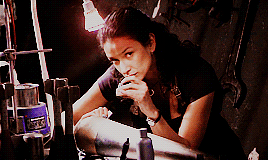
Suzie Costello, played by Indira Varma who is a British actress of Indian descent, was promoted alongside the regular cast members in publicity material before “Everything Changes” aired, giving the impression that she would be sticking around for a while or would be a main character. Instead, she was unceremoniously killed off at the end of the first episode and only pops up once more in “They Keep Killing Suzie.” At no point was Suzie acknowledged as a woman of color or given much more background beyond her tumultuous, most likely abusive, relationship with her father.
Next, we get to Toshiko Sato, left as the only person of color on the team after Suzie’s death.
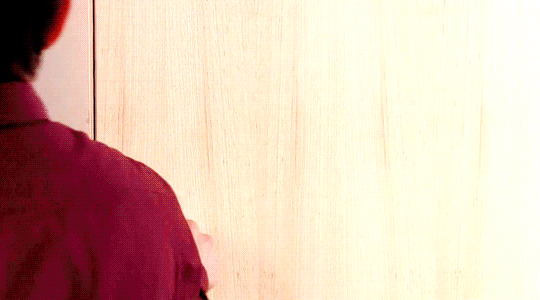
Wonderful, gorgeous, caring Tosh who, for all intents and purposes, is essentially a walking stereotype. She’s an Asian (Japanese specifically) technology genius who is unlucky at love. Need I say more? (Check out this Teen Vogue article if you’re wondering why that’s a bad thing, or, honestly, just quickly search Google.) And all three of the Tosh-heavy episodes (”Greeks Bearing Gifts,” “To the Last Man,” and “Adam”) feature her being unlucky in love (Mary betraying her, Tommy dying, and Adam manipulating her). Plus, there’s everything with Owen where she pines after him for years only for him to finally recognize that before he dies, and then he, well, dies; that plot arc only ends in death and sadness.
Additionally, we only have limited background for Tosh in comparison to Jack and Gwen (who I guess you could kind of say are the main characters) but even in comparison to Ianto (for whom more background was revealed only because he became a more prominent character in COE.) We know she was born in London, moved to Japan as a child, and at some point moved back before growing up in the United Kingdom. She had a younger brother (mentioned in a deleted scene in “Captain Jack Harkness”) and a grandfather who worked at Bletchley Park (mentioned in “Greeks Bearing Gifts” and “Captain Jack Harkness.”) She also very much loved her family, or at least her mother, enough to commit treason for her, despite her mother only being seen in “End of Days” and “Fragments.” But that’s about it.
There was so much more Torchwood could have done with Tosh. We could have seen more about her family or her education. We certainly could have seen more about her bisexuality; everything that happened with Mary was not a satisfying resolution. Instead, she was killed off alongside Owen in “Exit Wounds.” Torchwood used the death of a woman of color for shock value, and no matter how effective or emotional that was, it was not excusable. There was so much story left to be told with Toshiko Sato.
Tosh’s death brought the racial diversity in Torchwood down to zilch.
Next, we have Lisa Hallett.
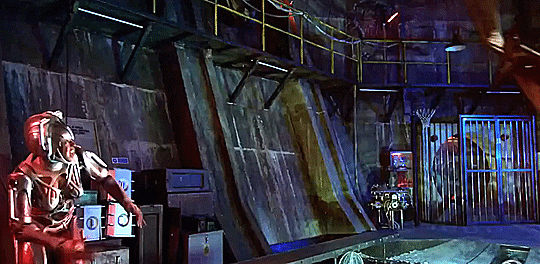
Now, Lisa Hallett...what do we actually know about her? She worked at Torchwood One, dated Ianto Jones, and loved him enough to maybe fight cyberprogramming for him - this part might be subjective to your own interpretation of “Cyberwoman.” We don’t know anything about her, really, apart from how she is defined and described for a white male main character, which...is problematic enough. I mean, would it have been too much to ask the writers for maybe some further description? I mean, I don’t know. Maybe where exactly she worked in Torchwood London? How she joined? How she met Ianto? If she had any family, any other friends? Why she loved Torchwood and worked there? Heck, a flashback scene featuring a non-cyberized Lisa and Ianto would have been brilliant. Is that too much to have asked of the Torchwood writers? I don’t know.
Then there’s the entire fact that Lisa was turned into a Cyberwoman. Now, I have many problems with how Doctor Who and Torchwood uses its Cybermen, especially regarding its continuous brutalization of black and brown bodies for emotional and shock value (Lisa, Danny Pink, and Bill Potts are only some examples.) It sends a very, very nasty message to these shows’ viewers of color, especially if they’re younger and more impressionable. Plus, the depiction of Lisa in “Cyberwoman” was uncomfortable and unnecessarily sexualized, but this is a whole different essay. But in the end, Lisa Hallett was pumped with bullets many, many times, and her death only added to the emotional pain of a white man.
Now, we come to more minor characters.
Beth Halloran was a human who did not know her true identity as an alien sleeper agent. She had a very interesting and action-packed story arc in “Sleeper” before ending up dead at the hands of Torchwood. She had an emotional struggle between her human identity and her truth as an alien sleeper and chose to help save the world, intentionally ending up dead at the hands of Torchwood. That being said, she was still another character of color who Torchwood had bothered fleshing out who ended up dead.
Next, there’s Dr. Rupesh Patanjali.
Introduced in COE, he’s a medical doctor who catches Jack and Ianto working on a case and ends up piquing their interest after he makes some shit up. Spoiler alert: he’s an MI-5 plant. We see Gwen attempt to conduct orientation and recruitment with him. He has a fun setup to be a potential new Torchwood member and inside spy, but instead, he lures Jack to the hospital where Jack’s implanted with a bomb. And despite doing his job as requested and doing it rather well, Rupesh Patanjali is shot dead by Agent Johnson that very episode, just like Beth.
Then we have Lois Habiba, arguably the most interesting and fun character introduced in COE.
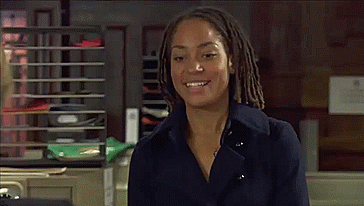
She’s a naive newcomer, almost like Gwen, but during her first week working in the Home Office, she finds herself committing treason, conspiring against her boss Frobisher, and helping save the world from an alien invasion. She’s smart, resourceful, and principled, very much like Ianto. Like with a lot of the characters on this list, we know next-to-nothing about her background, which is odd considering her rather major role in COE. And despite being seemingly set up to become a member of Torchwood, we never see her again.
Finally, we come to Miracle Day and its two new characters of color, Rex Matheson and Dr. Vera Juarez. I won’t be getting into too much detail here, especially since MD has its own problems.
Ah, Rex.

Torchwood finally has a man of color for a main character who seems like he could be an interesting foil to Jack (a high-ranking CIA agent with a high bullshit meter), and what do they do...they kill him in his first scene. Oh, and they make him “lightly” homophobic, because that’s always fun. And then he ends up immortal in some kind of bullshit plot hole...I have enough to say there.

Vera, however, was quite interesting. Again, little to no background besides the basic (from San Antonio, had an ex-husband, is a surgeon), but she was still a Latina medical doctor. She had morals and was very stubborn and determined to save people, which is why she insisted into helping Torchwood sneak into the overflow camp. And what did she get for that? She ended up brutually shot in front of her lover Rex, which traumatized them both, and then literally burnt alive. Thrown on top of that? In a quite meta move really, the death of another woman of color was used to incite outrage around the country, and the world, and expose the wrongdoings of the United States government regarding the Miracle. Good stuff? Either way, it came at the cost of the death of one strong woman of color and the further trauma of another man of color.
Plus, there’s everything about how unnecessarily violent and graphic some of the deaths of these characters of color. To put it into perspective, think about how Owen or Ianto or Esther died. (I’m not trying to reduce the values of their deaths; I’m just trying to get you to think about it.)
So yeah, that’s all I have to say about that. Torchwood, you could have done better with your characters of color. (And thank you if you stuck all this way with me.)
TLDR; Torchwood has neglected or mistreated its characters of color, given them little or no background, and brutally killed them off, often for shock value.
#torchwood#characters of color#torchwood meta#suzie costello#toshiko sato#lisa hallett#beth halloran#rupesh patanjali#rex matheson#vera juarez#children of earth#miracle day#nik wrote a literal essay
194 notes
·
View notes
Note
Okay, I'm reading Chap18, and I really hope this comment won't hurt your feelings because I love your fic and I really just want to understand why you wrote it this way, but I have to tell you that for the first time I've been disapointed with Diamants AU. I already felt it was going this way with Daphné, Arthur, Vallès, Emma and Alexia being LGBT, but I kind of felt betrayed with the Yann/Alex thing, and now I'm sensing Manon and Daphné will be together at some point too and ...(1)
...I don't understand why you made all your characters LGBT. I get that they are under-represented in most of the books and shows, but with Diamants I'm kind of feeling like being staight is a bad thing, like it's either boring or you're juste an asshole. I've always loved Skam because it shows that very different people can be friends and help each other no matter their religion, sexuality... and this kind of felt like the only reason they stand together is they're all LGBT (2) and I guess this comes from personal experience but that would have been so much more powerful to have straight people being as much invested in this war as the others. Honestly I don't see the point of Yann, Alex, Emma, Manon or Arthur not being straight, for me it doesn't bring more to who they are. This really feels like they would be nothing if they were straight. So I juste wanted to ask you why you decided this? Again, really hope this won't hurt you... (3/3)
hey anon. So, I’m going to assume this comes from a place of good faith and a sincere desire to understand, and explain my choices. That said, I do have to say that even though it didn’t really hurt me (it mostly made me laugh), it did make me a little angry too, because there are a lot of harmful implications in your messages.
1) First of all, about you “not seeing the point” of making certain characters LGBT. This functions under the assumption that there needs to be a reason for people to be gay, bi, trans, etc - and that straight people are the default. That is...really not great. People are gay in real life, for no reason whatsoever. If you don’t go to writers asking why they made their characters straight if there is no reason in the story, you shouldn’t do this either. Characters can be queer without it being a big part of the story - it’s just a part of them, and the idea that they have to ‘deserve a place’ in the narrative through their gayness (often through a deeply tragic arc full of suffering to Educate Straight people) is deeply heteronormative, and fucked up. LGBT people are not in a story to make a point, they’re there because they exist. Yes, some of my characters have arcs that are deeply entangled with their sexuality and struggles with it. Some are not. When it comes to Yann and Alex, I didn’t think too much about it, I thought it would be funny and unexpected and give some good shenanigans. Sometimes that’s all you need.
2) As for turning a majority of the canon straight characters LGBT : listen, in the end, this is my fic, and I do it because I want to. I’m bi and my life is full of queer people. This is my normal, this is what comes naturally to me, and what I find interesting to write about. I set out to write a James Bond parody with some deep character exploration, it’s meant to be a very transformative fic. I have no obligation to stick to any Skam ‘guidelines’. I am also not aiming to write a particularly realistic story, if the secret mobster conspiracy didn’t tick you off already. The ethos of fic is to make canon your playground and to let your imagination go wild. That said, this trope you’re probably used to, of having one or maybe two queer characters and not more in any given story, I would say is the less realistic one. In real life, LGBT people often tend to cluster together, often before they even realize their sexuality, especially as they get older. But a lot of mainstream media is afraid of that because they don’t want to alienate their straight audience, so they don’t show it. I have no such compunctions. Your message seems to imply that there is a limit to how many gay people there should be in a story and I find that deeply offensive. There is incredible relief, peace and power to be found in community, especially after being struggling so much with your sexuality, like Lucas did for instance. I wanted to show that joy in this chapter, and how it plays a part in him slowly letting his walls down.
3) I notice you don’t mention Imane. She’s straight, she’s super invested in this war, she’s neither boring or an asshole, in fact she’s probably the most important character in the fic after Lucas and Eliott. She’s badass and amazing and complex and if you don’t feel she counts as ‘good straight representation’ I find that slightly odd. Is she too ‘other’ for you that you would dismiss her like that ? Also, Basile is straight lmao. There’s plenty of straight people in this fic. And plenty of people who have incredibly different life experiences ; sexuality not being the main one doesn’t change that.
4) I do find it sort of silly that you reduce the characters’ reasons for fighting to being LGBT after I spent like 400k words proving otherwise. Like - Lucas wants to avenge his mother, Eliott wants to take down his father, Imane wants to avenge her father, Daphné wants to steal jewels, Alex and Emma are bored, Alexia’s a good friend (and also bored lol), they’re trying to stop horrible people from doing horrible things, their trajectories are layered and complex and if you tell me that can all be boiled down to ‘they’re gay’ I kind of wonder if you’ve paid attention to what you’ve read at all.
5) All that said, a majority of my characters being LGBT does have a symbolic point. It’s an opposition to the world of the Shadow, which is deeply sexist, heteronormative, homophobic, and macho. It represents how questioning your sexuality can be deeply liberating and often put you at odds with the general structures of power and oppression in society and lead you to question a lot more and find people who want to fight with you. Being LGBT can (but not always) make you more politically conscious and that’s a beautiful thing that deserves to be celebrated. And in general, being a minority makes you more aware of inequality because it’s simply your daily life. So it makes perfect sense that most of these characters who fight against symbols of horrible systemic oppression would be marginalized in some way or other. Straight/cis/white/rich/abled/etc people simply have less reasons to question the status quo. I have sat through so many action movies where all-straight heroes save the day ; I’m sure you can sit through the opposite for once. If you can’t, maybe it’s a failure of empathy or imagination on your part.
6) Imagine growing up and never seeing, around you or on TV or in books or movies, someone who shares your sexuality. Or if you ever see somebody like you, they will be a joke, a punchline, deluded, instable, doomed, or worse, a predator. Imagine the sort of damage that does. Imagine that when you finally find some correct representation, you have to make do with crumbs for years. Imagine it gets slowly better, but it’s still overwhelmingly tragic, or incorrect, or stereotypes, or only told after the story is over, or you’re always the best friend, always the minority, the point of interest there to educate, always there to struggle, never the epic breathtaking romance, never centered, never allowed community and to see yourself as the norm. In the best of cases, your identity is more or less ignored. In the rare cases where you find good representation, shows get cancelled prematurely, or your faves never get as much screen time as the straight ones, or storylines get botched because somehow writers think showing queer characters happy has no value. Imagine then you decide to take matters in your own hands and write the sort of queer utopia that makes you truly happy - the one where you’re surrounded with people like you and you don’t have to constantly feel isolated and otherized and you’re badass and don’t have to take any shit and your love story is the epic one that gets centered and you have friends who understand and share your experience. And then imagine someone, instead of taking a deep breath and going back to like, 99% of all media ever made, randomly comes to you and tells you they feel ‘betrayed’ because in this one paltry little fic you wrote, their mainstream experience is not centered like usual. Tell me, how would that feel ?
Again, I don’t bear you any ill will, but your message comes across as ignorant and very entitled. I am open to feedback and criticism but writing a story full of LGBT people is one thing I will never feel sorry for. There are a shit ton of fics out of there where those characters are straight, not to mention canon. If you feel ‘betrayed’ by the amount of queer characters in my fic, then I’d say you have some biases you need to examine. It reminds me of all the times I’ve heard people say that they ‘like gay people but only if they’re not too in your face’ (lol that was my sister, so fun) - this implication that queer people should know their place, never show their difference too openly, accept being a minority in all spaces, need to ‘deserve’ their spot, center straight people’s needs, etc etc...is deeply harmful and toxic.
If you can’t understand all this, then my writing is probably not for you.
29 notes
·
View notes
Note
i hate to actually get what the writers were trying to do with owen here and his reaction to the story behind alison's name but being that grey's tries to be this progressive show and how they're all about owen hunt being a good man deep down (like yeah ok sure keep saying it and not showing it you pieces of shit lol) i feel like that line wasn't so much about him having an issue with her sexual orientation as him being angry at one more lie/omission in the wake of discovering her cheating
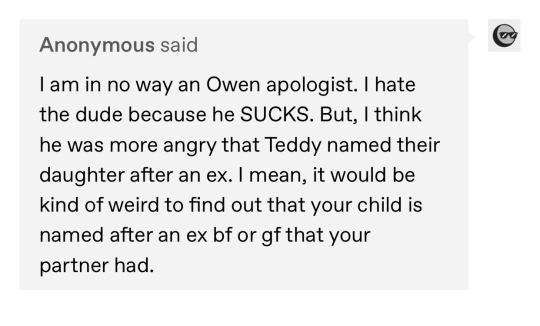

LOL @ “keep saying [you’re a progressive show] and now showing it, you pieces of shit”. I FEEL THIS IN MY BOOOOOOONES
Not to be that bitch and please call me out if what I’m saying is problematic... but where are the black and brown covid patients that they keep talking about????? All I see is Mer and Tom being sickos. I wanna know about these patients: their stories, their struggles, their bonds between family, friends, and doctors and staff and nurses. It’s ep 5 and we’ve seen two instances of white people being “schooled” by poc and that’s boring af. Bailey’s story about her mom dying was the closest we got. We can have stories without white people, thanks.
ANYWAYS SORRY OFF TOPIC LOL
If you read my fics, you know I love one-liners that hit. I know they were trying that with Owen but it’s just in poor taste. It’s poor because I don’t know if I’m supposed to side with Teddy or with Owen. And it’s poor because the entire conversation checks off points in the biphobic checklist (Teddy being conveniently bi, how she lied, how she cheated, etc.) and it’s like ~yikes!!!!~. And it’s in poor taste because, in general, this storyline is so damn fucking BORING and I can’t believe Teddy has been reduced to this. And Owen too.
And I know he feels betrayed and as he should and it would be irk-y to know your child was named after your cheating spouse’s lover (WHO’S DEAD BTW. Does Owen know that??? Does Owen know about Allison????). It’s like if she named her child Tom, lmao. But at the same time, it’s NOT the same. Because Teddy is bi and queer and Allison is dead.
(Also I can’t remember if Teddy told Owen about Allison or that she was in love with a woman but the following is under the assumption that she didn’t:)
I’m talking in circles but like I said in my other ask: I don’t expect the characters to understand these nuances. They could very well say the exact same thing but if the show framed it differently, with a little more introspection from either Owen or teddy or both, it could be queer-conscious or clearer as to what Owen means by all that. Right now, Teddy’s just a cheater and she’s bi and she lied and Owen is mad. And that’s what grey’s is showing us.
I would’ve liked to see Teddy struggle with telling Owen she’s bi/was in love with a woman. That her love for Allison was difficult and hard for her and it’s why she named her child after her. I know we had that one episode but the struggle ain’t over and now it could be framed with how Teddy feels about Owen (that she feels like she owes him the truth or this piece of knowledge). But all we had was Teddy just tell Owen, “I named our child after the first love of my life.” Allison’s way more than the first (or greatest. Whatever she said. I only watched the ep once so please call me out of everything I’m saying is wrong lol) It’s just different when you’re queer.
BUT *throws hands in the air* how can I expect grey’s to understand that??? So I’ll just have to move on and hope it gets better in the new year when they’ve had time to gauge people’s reactions before they film the other episodes.
#eh#tired of Owen being the victim honestly#I’d much rather see him struggling with his ptsd or being scared about fatherhood#or seeing covid and realizing he needs to better the hospital#just anything other than him always trying to put rings on ladies and thinking that’s a solution to his life’s goals#grey's anatomy#gk asks#anonymous
13 notes
·
View notes
Text
The Strides and Shortcomings of Queer BIPOC Representation on Television
Series like Orange is the New Black and The L Word pioneered the contemporary lesbian revolution on television by introducing us to entire casts of queer characters and relationships. Characters like Shane and Piper were beloved and revolutionary to an audience that could relate to the experience of being white and queer, but for a BIPOC audience, the portrayals were often tragic, unrealistic, or insignificant. Although these shows exist in the LGTBQ+ television canon, having predominantly white producers and writers leads to myopic portrayals of BIPOC characters. Orange is the New Black was praised for its range of representation but where that diversity ended--and was needed--was the Writer’s Room.
While the show struggled to portray its BIPOC characters with dignity, Piper, the protagonist, profited from the system in a way her BIPOC counterparts did not. Criticism grew louder with the death of beloved character, Poussey, and continued for its treatment, of the remaining BIPOC women and queer-identifying characters. Similarly, The L Word has been criticized for its treatment of BIPOC characters (the few they had were either killed or reduced to stereotypes), and specifically the show’s handling of bisexual and transgender characters.
The television industry tried to answer the criticism by introducing new BIPOC queer characters to its larger casts. Rosa Diaz from Brooklyn 99 came out as bisexual in the fifth season of the show, with an entire episode centered around her coming out to her Hispanic parents---highlighting a culture where homosexuality is often not accepted. Kat from The Bold Type came out as queer---a pivot from the standard formula we’ve seen of shows that star women navigating a big city like New York. After her first relationship with a woman, she further explores her sexuality within an open relationship. Then there’s Eric Effiong, the bestfriend of the straight protagonist, Otis Millburn from Sex Education. His sexuality is never troped but instead, is a facet of a charming and complex teenager. While this is a step in the right direction, the problem remains that BIPOC characters are often minimized in favor of their heteronormative, white counterparts. We see this in shows like Shrill, a comedy series that offers a variety of BIPOC queer characters, but reduces them to stereotypes to play off of the complexities of the protagonist, a heterosexual white woman.
Characters often lack authenticity, a problem that stems in part from the lack of representation in producer and writer roles. A significant moment, in which Kat is arrested for trying to stand up for Adena, is lost as writers fail to acknowledge what a situation like that could realistically look like for someone like Kat. Love, Victor which attempts to show the struggles of Latin protagonist, Victor, by giving him a traditional Latinx family to come out to, falls short at portraying an authentic experience. Both producers of Love, Victor are white, but contrast that with One Day at a Time, a series co-produced by Gloria Calderòn Kellet, who is Cuban. The series, about a Cuban American family--one member being the queer daughter, Elena--is rich with cultural authenticity. This is showcased in the way the Alvarez family, especially the younger generation, interacts with cultural traditions, like Elena’s resistance to a traditional Quinceañera because of its misogynistic history. Kellet also made sure to have a predominantly Latinx writing staff for the show.
There are a few series who have taken the lead in portraying nuanced queer relationships and identities with a BIPOC protagonist. High Fidelity stars Zoë Kravitz as Rob, a biracial Black queer woman, who keeps a list of her “Top 5 Heartbreaks,” including a woman. While the show explores Rob’s relationships with men more thoroughly, that doesn’t negate Rob’s queer identity. In Vida, Emma is a queer Chicana, kicked out of her home as a teenager by her mother for her identity and she later returns to her old neighborhood to help run the family bar after her mother’s death to reconcile with the emotional damage her mother left behind. Emma’s identity is fluid and she finds herself having to defend her queerness at a table full of fellow queer women. Known as “identity policing,” this moment shines a light on the complexities within LGBTQ+ communities. Twenties is another series we see with a BIPOC, queer protagonist. Hattie, a character based on show writer Lena Waithe, boldly navigates the entertainment industry by defying the norms of what it means to create good work as a Black creator while also navigating within a community of straight friends and unhealthy relationships. Jonica “JoJo” Gibs, the actor playing Hattie, said, “Having Hattie on TV as a masculine-presenting queer person — female — I think it’s revolutionary.” A nuanced portrayal of queer love is explored thoroughly in Euphoria with Rue and Jules. The show’s portrayal of a relationship on television between a cis woman and transwoman, especially one that is interracial, is not a dynamic we see often. Each of the above-mentioned characters are multifaceted and rooted in their cultural and queer identity. But being a revolutionary character in television can isolate them as the example for what it means to have a certain identity or a certain experience. Emma’s story is not the epitome of what it’s like to be queer Chicana woman living in Los Angeles. Kat’s is not the only story for a biracial Black queer woman in New York.
While it’s great to see more portrayals of BIPOC, queer characters written by BIPOC creators, it’s important that we begin to see these characters on a broader and mainstream scale, or risk-reducing these single narratives and characters to stereotypes. We’ve begun to see more Black and Latinx creators, but there is still a lot of representation that is lacking. Where are the stories centered around Indigenous people and their specific struggles? Asian? Transgender? The television industry needs to allow these stories to reach the mainstream, to stop relegating the many intricacies of these underrepresented identities and experiences to the periphery of the industry. And although these conversations are not always palatable to a white audience, that is exactly why they are so important to have.
#tv#culture#bipoc#characters#qtbipoc#orange is the new black#the l-word#brooklyn 99#the bold type#sex education#one day at a time#high fidelity#hulu#vida#represenation#euphoria#twenties#diversity#inclusion#latinx#queer#asian#bet#starz
40 notes
·
View notes
Text
Feminist Vampires: Don’t Invite Mainstream Audiences Inside! (Madi Mackey)
youtube
Bit, written and directed by Brad Michael Elmore, is the story of a young trans woman named Laurel who moves to Los Angeles and finds herself mixed up in a friend group of female vampires. She is quickly turned into a vampire herself and thrust into their world. Duke, the leader of the girl gang, implements some very strict rules for the group. The most important rule is to never turn a man into a vampire, stating that they can’t handle the power. The film follows the five young women as they navigate their lives as both vampires and members of a bustling Los Angeles night life. The drama comes to a peak when Laurel accidentally bites her brother and has to decide between saving his life and following Duke’s rules.
The film is an excellent example of modern day intersectional feminism. The core group of women is very diverse, representing African American, latina, butch, and transgender identities. They are all women-loving women in some sense, though their specific sexualities are never detailed. They are unflinchingly focused on retaining their power and their sisterhood by refusing to let a man into their groups and forbidding any usage of their mind-influencing powers on each other. However, the film is not perfect, and does not hold up to much scrutiny from a queer perspective. Duke, the previously mentioned leader, is also the only white girl in the group. Their hatred toward men could push the idea that all feminists hate men, further isolating the movement. Finally, the film does not mention class or any struggles associated with the marginalized communities the characters belong to, reducing the film to a post-gender, post-sexuality world. For these shortcomings, I argue that Bit is a great stride in the queer movie industry, but it misses the mark in many categories, and could therefore cause more damage to the trans, lesbian, and feminist communities than the positive impacts of such representation could outweigh, if it were to leave the arthouse and break into the mainstream.
One major theme in Bit is intersectional feminism. As mentioned before, the group of vampires is quite diverse, but this inclusion is only skin-deep. Their dynamic still enforces white, middle-class homonormativity. The girl with the most power is white and cisgender, and all of the girls are able-bodied and middle- to upper-class. Joyrich explains that television industries must continually portray homonormativity to maintain profits, and the same can be said for the film industry (2013, p. 5). Although this is a low-budget film that premiered at an independent film festival, the director, Elmore, stated in an interview that one of his main goals was for the movie to reach a larger audience of at-home viewers (Dunagan, 2019). His yearning for mass reception might have caused him to reproduce homonormativity for the film to be more palatable and, therefore, more profitable.
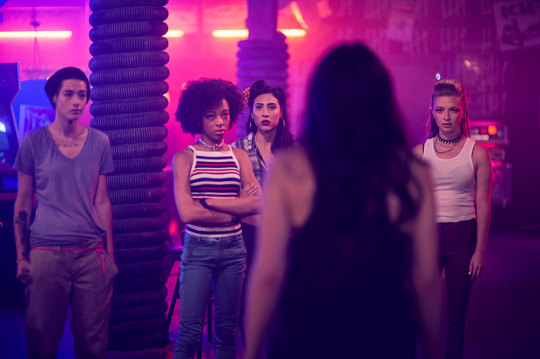
This is not the only flaw within the production practices for this film. Similar to criticisms regarding Pose and The Death and Life of Marsha P. Johnson, Elmore is a cis white man who took it upon himself to tell a queer story. By doing so, he took production resources and material benefits from its popularity away from the trans, lesbian, and POC communities who live the stories that he is telling (Tourmaline, 2017). Elmore explains that he read multiple theoretical texts and memoirs regarding gender while writing the script, and then had a close, gender non-conforming friend of his approve it before he, “felt more comfortable to show it to people in and around that conversation and community that I wasn’t close to” (Dunagan, 2019). While he did a fair bit of research into the community before creating the film, this isn’t the same as being a member of the community. Cavalcante explains this difference as a split between identifying with and identifying as a character, with identifying as a character always hitting closer to home and being more personal (2017, p. 14). Although Cavalcante makes this distinction in regards to audience reception, I believe it can be applied to production as well, and how Elmore wrote characters he could identify with, whereas a trans or POC writer could have written more personal characters that they identify as. Because Elmore is not trans or a POC, he needed to enforce homonormativity in his film in order to create characters that he identified with, as he has never lived as someone on the margins.
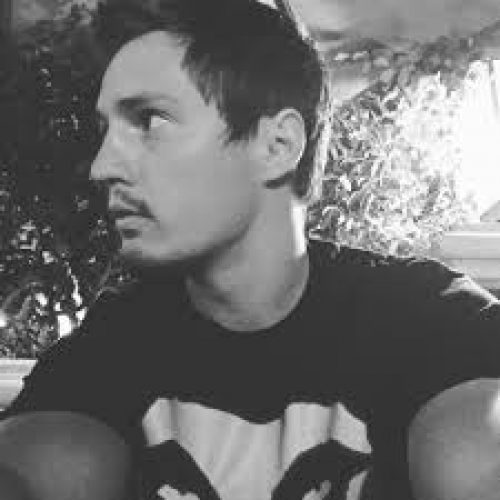
(Brad Michael Elmore, writer and producer of Bit)
Still, the production methods and content of the movie themselves could absolutely be described as queer. Benshoff & Griffin describe new queer cinema as films that have low-budgets, usually remain in the arthouse, and show the inadequacy of labels, instead focusing on the social discourses surrounding gender, race, and class (2004, pp. 11-12). Bit checks all of these boxes, even offering some helpful insights into social discourses. When Laurel, the transgender protagonist, is turned into a vampire, Duke tells her that their number one rule is to absolutely never turn a man. Laurel looks worried and asks, “What about me?” to which Duke responds, “Never even crossed my mind” (Elmore, 2019). Her immediate acceptance of Laurel’s identity expresses a consistent mood throughout the entire movie. Laurel’s transition and identity are never remarked in more explicit terms, and the sexuality and ethnicity of the other women are all treated with the same unspoken acceptance. The only identities that are ever mentioned are class and sex; Laurel asks one of the girls how they afford to live in L.A., and anyone who identifies as a man is immediately treated with contempt.
youtube
(watch video until 42:50)
While these approaches to intersectional identity may function well within the underground audience of new queer cinema, they could cause problems if Bit were to hit the mainstream. As Tongson explains, media representations help to produce our material realities; we rely on media to understand identities that we don’t know in the real world (2017, p. 158)). By ignoring the struggles of marginalized communities in the film, Bit raises more questions than it answers for viewers who are unfamiliar with these communities. Their confusion could cause these people on the margins to become cultural interpreters and explain their communities to those who don’t understand. Some see this as an opportunity to share their life experiences and cross cultural bridges; for others, it can become a burden of representation and they may lose a feeling of privacy (Cavalcante, 2017, p. 11). Bit could be seen as a welcome break from tragic representations for people within the trans community. Conversely, Elmore’s silence on these issues could also lead mainstream audiences to believing that marginalized communities do not face any struggles in modern America, and therefore lose some empathy.
This mediated understanding of reality could also be greatly detrimental to the feminist movement if it were to hit the mainstream. While I loved the explicitly feminist tone of the film, other audiences could find it off-putting and apply Bit’s ideology to all real-life feminists. The group of women in this film are quite outspoken around their distrust and distaste toward men. This could be applied to feminists, who are already called “man haters” in the real world as an attempt to invalidate their arguments. Elmore could be adding fuel to this fire by depicting feminists as exactly what the mainstream fears them to be.
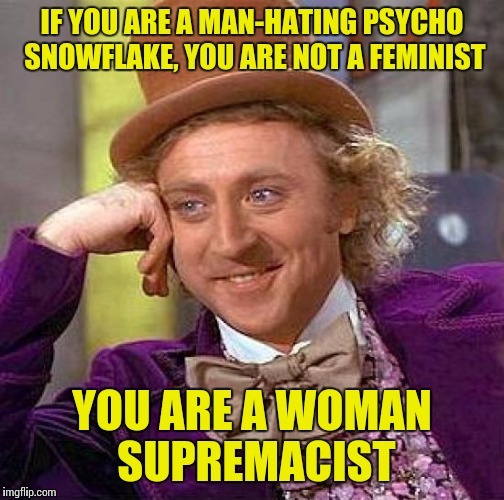
Simultaneously, this bold approach to intersectional feminism is exactly why I, and many other queer viewers, love this film. My own subject positionality influences my understanding of Bit, just as those of mainstream audiences would make them feel differently about the film. I am a college-educated, middle-class, white, bisexual woman. I am also an outspoken feminist and socialist. All of my converging identities influence my view on this film and the opinions I have on its themes. As a young person who spends a lot of time in feminist spaces online, I felt such a rush while watching this film and hearing them directly saying things like, “Men can’t handle power. They have it already, and look at what they have done with it” (Elmore, 2019). A lot of people online say things about hating men, and I know from my own personal experience that the argument is so nuanced that it is simply easier to say “kill all men” than it is to explain what feminism really stands for and how it is, in fact, not simply man-hating. I love that this film expects the viewer to have this same knowledge, and can therefore say things like this without needing to defend itself and explain all of the nuance behind such a statement.
My status as middle-class and a socialist also have a great impact on my subject positionality and interpretation of Bit. Coming from a middle-class family and city, everything in the movie seemed normal to me. I was able to identify with the characters’ struggles, as they didn’t have anything to do with money or family issues. However, I could see this posing an issue for people who are struggling financially or with their family dynamic. To make up for this, the film has a lot of discourse regarding the redistribution of power and resources. Downward redistribution is a key tenant of leftism, so this movie displays clear leftist ideologies from a socio-political perspective (Duggan, 2002, p.XVI). We can see this in lines like, “How would you like to hold the keys to the kingdom for a change?” when Duke is talking to Laurel about turning, and at the very end of the movie, when Laurel’s brother asks her what they should do next and she responds, “Maybe what everyone with power should do and never does: share it” (Elmore, 2019).
youtube
(watch video until 1:30:00)
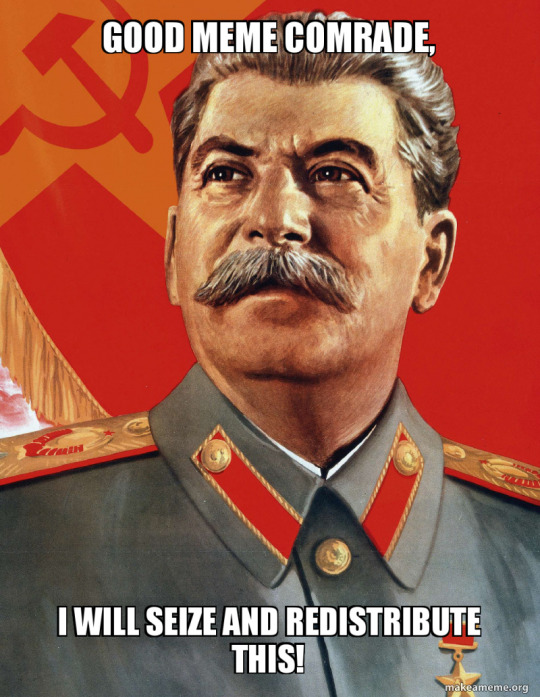
Finally, watching this film from the subject positionality of a woman greatly influenced my interpretation and reaction. At first, I was appalled by the group of girls and how nonchalantly they killed people, especially men. Laurel was written to have the same feelings of shock and disgust. So, when Duke said, “Our role is secondary. Our bodies are suspect, alien, other. We’re made to be monstrous, so let’s be monsters,” (Elmore, 2019) that was enough of an explanation for Laurel, and for myself, to become sympathetic to their cause. I have been personally affected by the feelings of otherness and being secondary that Duke lists, so this was a perfect line to change my opinion on their actions. However, if a man were to watch this film, especially if he were not to be a feminist, he might not be so sympathetic because he does not have the same experiences and understanding of what it is like to live in this world.
youtube
(watch until 41:12)
Bit is a film that crosses many boundaries, while still upholding some homonormativity for the sake of profit and consumption. It was written with the expectation of an audience that is knowledgeable of marginalized communities and social issues, making it thoroughly enjoyable to watch from a queer perspective. However, if the film were to break into the mainstream spotlight, its lack of nuance could cause harmful backlash toward trans communities, people of color, woman-loving women, and feminist movements.
References
Benshoff, H. M. & Griffin, S. (2004). Queer cinema: The film reader. Psychology Press.
Cavalcante, A. (2017). Breaking into transgender life: Transgender audiences’ experiences with ‘first of its kind’ visibility in popular media. Communication, Culture & Critique, 10(3), 538-555. https://doi.org/10.1111/cccr.12165
Duggan, L. (2002). Introduction. In The twilight of equality? Neoliberalism, cultural politics, and the attack on democracy (pp. X-XXII). Beacon Press.
Dunagan, R. (2019, August 2). Interview: A talk with Brad Michael Elmore, Director of OUTFEST’s ‘Bit’. Flipscreen. https://flipscreened.com/2019/08/02/interview-a-talk-with-brad-michael-elmore-director-of-outfests-bit/
Elmore, B. M. (Director). (2019). Bit [Film]. Vertical Entertainment.
Joyrich, L. (2013). Queer television studies: Currents, flows, and (main)streams. Cinema Journal, 53(2), 133-139. https://doi.org/10.1353/cj.2014.0015
Tongson, K. (2017). Queer. In L. Ouellette & J. Gray (Eds.), Keywords for media studies (pp. 157-160). NYU Press.
Tourmaline. (2017, October 11). Tourmaline on transgender storytelling, David France, and the Netflix Marsha P. Johnson Documentary. Teen Vogue. https://www.teenvogue.com/story/reina-gossett-marsha-p-johnson-op-ed
6 notes
·
View notes
Note
Why do you think Supernatural has such a large LGBTQ+ following? The representation of queer people ist piss poor and most of the time non-existent. Is it because of the IMO queerbaiting or are there other reasons?
I personally think that it’s a bit offensive to say that queer viewers are attracted to a product either because there is “representation” or because they’re “baited” into watching it. Gays watched television before Glee aired and they weren’t just watching Will & Grace. I'll also go on a limb here and say that I suspect that Supernatural is more popular among an older queer audience while a younger queer audience is more likely to be critical of it. There is a generational divide in how the queer audience relates to media, after all.
Before “representation”, queer subtext was the way for queer creators or queer actors to convey “we’re here, we see you” to queer people in the audience. I am not saying that was good and the way things are now is bad, because it’s only progress to have actual explicit queerness in media. We’re not arrived to the end of that process, though, and a lot of explicit representation is highly unsatisfactory (token characters, “bury your gays”, stereotypes that are still hard to kill, narratives limited to coming out or dealing with homophobia, etc).
An older audience is used to see subtext and appreciate it. A younger audience sees the same thing and instead of subtext they see queerbaiting, i.e. creators - who are assumed to be nonqueer, or whose queerness is not considered relevant to the discussion - dangling a “promise” of queerness that is not delivered.
Supernatural is, at its core, a show based on nostalgia. I believe it deliberately plays on an “old school” way of crafting stories, including subtext, which is also why I believe it makes no sense to compare Supernatural with a Shadowhunters or a Lucifer and point fingers and say “that one does the thing”, because we’re talking completely different storytelling ways. While Supernatural has definitely evolved through the years and “modernized” itself in many ways, it’s still a narrative that likes to keep a foot in a 1980s shoe. You can like it or not, but it’s one of the things that have made the show what it is, given it a specific identity, and make it last this long.
But the fundamental thing in this discussion is that Supernatural is a story about identity, agency, bodily autonomy, corporeity and violation, abusive parental expectations, defying paternal or paternal-coded and religious-themed authority - what about this doesn’t seem interesting for a queer audience? There are themes of non-normative experiences including in the sphere of sexuality and relationships, there is an undercurrent of masculinity as a theme, and of course Supernatural is a horror story, with all the history of the genre it references and pays homage to, and the genre plays (in good or bad ways) on non-normativity, social subversion, corporeity, and gender. (A fundamental mistake, in my personal opinion, is to think of Supernatural as a drama show, because then it just becomes a bad drama show.)
Why do you think queer people flocked to Captain America: The Winter Soldier, because they were deluded that Marvel Studios would deliver queer representation or because of a narrative about identity, agency, bodily autonomy and defying the authority of the wealthy white male figure in a position of power used for imperialistic totalitarian purposes? (Not coincidentally, The Winter Soldier plays with tropes from the horror genre.)
The main character of Supernatural is a queercoded man who a lot of queer viewers have identified with - I don’t think that experience is worthless just because it’s not textually explicit that the character is queer. A lot of explicitly queer characters in television are not given the same depth and relevance in the story as Dean Winchester, and maybe they’re relatable for their experiences with coming out or dealing with homophobia but that’s it. Dean’s story is about things that resonate with many queer people, his struggles with finding his role in the world as an outcast who feels like a freak for social reasons (unlike Sam’s “supernatural” reasons), as a man in a model of masculinity that is too restrictive and toxic for him, as an inherently antiauthoritarian, subversive force in a conservative, hierarchical system - does all of this get null because the character isn’t explicited as a mlm? Dean’s story is pretty much a journey about embracing a queer experience, is that less worthy of consideration just because it’s not about (explicitly) embracing a queer identity?
There’s also another thing - the inherent value of a metaphor. Castiel’s story, for instance, is basically a metaphor for the experiences of a queer, specifically trans for certain aspects, person from a hostile family. But it’s not - does that make it void of significance for a person with those experiences? I don’t think so. It can be uncomfortable and triggering to watch the same traumatic experiences as yours, but it can be more emotionally useful to watch a metaphor of them. A queercoded narrative can offer the viewer the experience of identification with the character and their story, but with a distance: you don’t live the same traumatic experiences while you “are” Castiel, but you live experiences that have similar aspects, but in an “unrealistic” context, that allow you to elaborate emotions while maintaining an emotional distance.
This doesn’t mean that a queer viewers has to like it just because. Nor that Supernatural shouldn’t have done things differently/better. (It is really not a perfect show.) But it seems to me that there are pretty obvious reasons for its popularity among a queer audience, and I don’t think those are reducible to the queer audience being “baited” into watching something that eventually reveals itself as unsatisfactory and disappointing.
I do realize that my experience with watching Supernatural is not the same as many other fans here on tumblr & adjacent, but universal experiences don’t exist, so I suppose that neither is the “true” one. These were my two cents on the matter and I hope it was a satisfying answer! I probably came off as a bit abrasive but I’ve spent way too many years on this site surrounded by talk of queerbaiting so I hope you can understand :)
679 notes
·
View notes
Note
You seem to be having a not a great day today, so here's a light-hearted ask. I'm having a good day, curled up in pjs with cuddly pets watching Leverage with my sister. Leverage is one of my favorite shows, because it's smart and fun and has great characters that grow over the seasons. Besides Supernatural, what's a show you really enjoy and why?
Thank you so much for the ask! I’m sorry I didn’t reply to it sooner, I’ve come down with a head cold and this is really the first day in several I’ve been able to compose more than a tweet about how much it sucks (swallowing = a knife jammed right into my inner ear, it’s super fun). But I did want to answer your question so I’ve been musing on it since your ask came in.
If it was just “what’s your favorite show right now” it’d be an easy answer: The Boys. The Boys, back to front, front to back, upside down and inside out. The first season was fantastic, and it felt like it woke me up to being excited about TV again after my interest in The Walking Dead waned mid-season. Everything new has seemed very plastic recently, and even The Mandalorian, which is super cool, is kind of like the Cartoon Network dub of Dragonball Z, so Disneyfied in its bloodlessness that although I’m enjoying it it feels even more synthetic as a result. The Boys was the opposite of that, and also just whoever invented Karl Urban, period, just deserves a nobel prize for that masterpiece. He pronounces twat wrong (okay okay it’s a dialect thing) but you can’t have everything =D
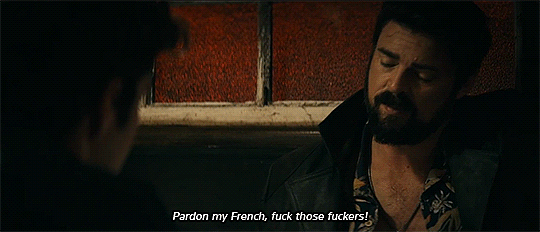
So instead (and because it’s cheating that I can pimp The Boys and wax lyrical about loves of old) I interpret your question as sort of like “Which show is your comfort food?” Which show do I go back to when I’m feeling like TV needs to give me a cuddle. I had a good think about it, because there’s a few…
(aside: I shouldn’t have put that gif in before I started writing. ahem.)
There’s been a few over the years, for sure. As a thirteen year old I used to watch and rewatch Buffy episodes, mostly season 2 (baby Spike!). At eighteen, it was old VHS of Deep Space Nine, my favorite ep was “Wrongs Darker Than Death or Night” which I watched repeatedly and think about constantly even today.
But the show I keep coming back to is due South.
This post is a long post, it also deals with discourse (because my relationship to entertainment is so often mired in it, so please don’t proceed if you’re rather avoid it) and this is where it begins:
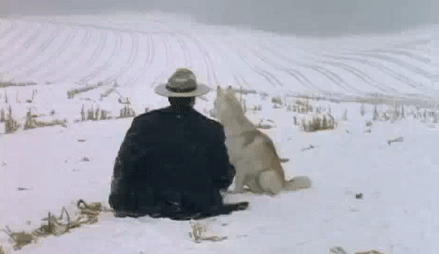
Okay, so fun fact: I watched due South the first time it aired with my parents (I was about 9) and then when it was on TV again as a repeat, I recorded it on VHS by RUSHING home every single day from school with nothing else on my mind but sitting on the floor two feet from the telly to watch it. Quantum Leap was on right after, and I had an entire different set of VHS tapes to record that on, so had to quickly switch between them. I’d stop recording at every break so that I could get more episodes on a tape. It’s not unsurprising to me now that both shows vibed with me as a young person who hadn’t yet really accepted that she was queer; due South’s main character is coded as Other both to the Americans whom he lives with, and his fellow Canadians, while Quantum Leap explores a straight white man jumping into the lives of Others, and living through them some of the hardest moments in their lives. Even though both keep it exceedingly, textually hetero, one has two men riding off into the snowy sunset together (leaving behind a straight lover to do so) and the other features a love between two men that in the original framing of the finale would have seen God/fate reconnecting the two of them even though one was lost in time, and the partner’s wife begging him to go.)

Of course young me didn’t give a shit about that, or didn’t realize that’s what she cared about. Young me loved the buddy-cop partnership of both shows. Young me liked the half-wolf, and the episodes where they ride horses, and honestly just waiting with bated breath to find out where Sam would jump to this time. “Oh boy!” Retrospectively, these shows (especially QL) are a lot more oh boy in a yikes context now than they used to be, but it’s good that shows age into yikes territory because it means that society is steadily advancing. Particularly, pointing out that these shows both feature white straight guys like…welcome to the nineties.
I was introduced to queer coding in part by watching due South. The show is laden with it. With writers, actors, and ultimately an executive producer who was all three, it makes you wonder if they would have gone there if they could; certainly the ending reads that way. They couldn’t, of course, because it was the nineties (and it was CBS that revived it after enormous international fan demand). Still, there was just nothing else analogous to what we have now that was going there on TV at the time. If you were queer (or discovering your queerness) then watching the show meant everything, as it did to me. So I snuggle up on the couch often these days and go back to that, because it gave me such joy, and because I was left with the opportunity to decide for myself how deep the relationship was. There was no promise of anything, because the context at the time was of course you can’t go there, nobody can go there. Queerbaiting was a word that simply hadn’t been breathed. There was no intent, no companies behind the curtain pulling strings going “Yes, make it more gay, we want those queer dollars”, just invested people slipping what they could past the studio censors.
Like this:
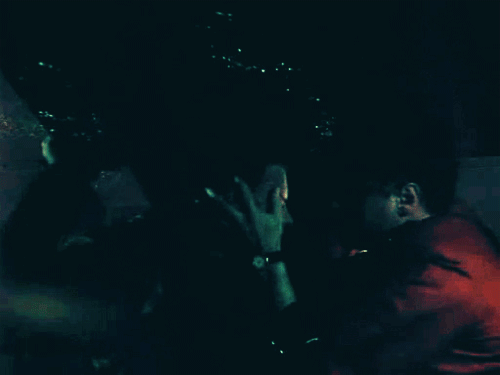
Sigh. A less enlightened time. =P (Incidentally fun meta here but this was after a conversation where Ray suggested that communication in a relationship should be intuitive, like breathing.)
So I guess in part I escape back there because none of that representation was ever as loaded as it is today. It doesn’t require me to judge it, or weigh it against the harm it does - because the politics of the time meant I thought it was doing good (retrospectively, and only through the lens of someone who had nothing to lose). It seemed to scream out into an unyielding universe to force it to move. It did a fraction of that, because of course it did. It was the nineties. It stole indigenous narratives and romanticized colonialism just as much as it beat the drum of environmentalism and kicked at the doors of corporate greed and racism. Old shows are inherently problematic. Today’s shows are too. Being able to examine them doesn’t mean not loving them, but it lets you say “Okay, so what do I expect from the things I watch today? What do I expect from the things I watch in five years time?”
All that aside, the show is just damn good. It’s watchable and rewatchable. It struggles to age because it was already so out of pace with the age it was made in–despite its flaws in representation, it was better than other shows at the time that demonized, tokenized, or outright killed minorities to push white narratives on their own shows (Kendra being murdered on Buffy, for example). It’s standalone enough that you can go back and watch any episode you like because overarching story arcs were way less of a staple as they are today. It’s witty, fast paced, full of action and moral dilemma, do gooding and the consequences of it. Although still severely unbalanced, and very, very white, it did still have indigenous actors playing indigenous characters, and minorities portrayed in stories about them. There’s a dog. There’s classic cars. And it’s all put to the soundtrack of Canadian bands and singers.
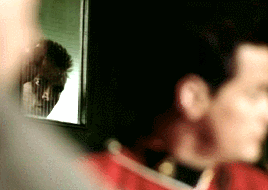
tl;dr ahead for rambling about subtext and being a disaster queer, but please scroll past for more gifs.
Queer me needed this show, in a world where I’d been taught to look and see myself in straight white male protagonists, it felt like A Lot to see all this on screen. It wasn’t, but it was all I got when I was growing up. I envy the good fortune of kids who can see themselves on screen these days while they try and figure themselves out (and hopefully more so in the future) with far less of having to negotiate through the confusion of looking at it through confusing fractals of different lenses and instead just see someone who looks like them showing them that their POV is normal, heroic and wonderful. Those lenses fucked me up big time. Like I’m not even sure right now what flavor of queer I am. I cling to bi like a lifeline of sense in my life, but it is complicated because I overwhelmingly desire the company of women way way more. But also I was was taught to look through the lens of a white dude in order to see myself universally, taught to be both desirous of the female body and humiliated by it, ashamed by sex, taught men were awful, and taught that I was supposed to marry one anyway. I look at my sexuality/romanticism like it’s a meta puzzle that I haven’t figured out yet, wondering how to put it on paper, how to break apart the different influences I experienced as a youngling and as an adult to try and negotiate if I’m misreading my own impulses. How I was brought up, who I’ve known, the relationships I’ve experienced and seen in real life and on TV. I’m 34 and I’m still no more certain. Subtext is both my friend and my enemy. I hate it, and I owe everything to it.
So when I need a rest from giving a shit about any of that noise, I go back to my comfort food. I go right back to subtext, which gave me the tools I needed to desire romance that wasn’t heterosexual, that somehow was more intimate because it relied on longing stares and never stepping foot out of the closet, that was just someone liking another person without any expectation of sex just because they have opposing genitals, and their colleagues hassle them a lot. There’s nothing wrong with the sex, I write a lot of consommation of the feelings that I see bubbling under the surface. I have even grown to appreciate het romance when it’s done in a way that doesn’t reduce the woman to a love interest–I was thrilled when Simon Baker’s Patrick Jane got together with Teresa Lisbon in The Mentalist. Their relationship was filled with subtext too. Subtext isn’t a queer thing, it has a role in all well written romance. Hell, it has a role in terriblebad tropey misogynistic romance, too. And just you know basically all storytelling (and more).
Queer romance existing only in the subtext, though? It’s heartbreaking explicitly because it feels like a story that isn’t finished, and that’s where subtext reliant shows can hand off the story to be finished by fandom itself. In due South, as I mentioned before, Ray and Fraser jump into a dogsled and ride off over the snowy horizon to “Find the hand of Franklin, reaching for the Beaufort sea”. It’s where I chose my meta name, as I’ve mentioned before, because that ending - that ending - handed us all the subtext so far and said “Here, take it, it’s yours now. Do with it what you like”–and we did. But that was twenty years ago. I loved that ending (I still think it was a very elegant solution) and it was expected and appropriate for a show that in itself is a “Faves Are Problematic” show, but that’s also why I get so passionate about discussing the subtext in Supernatural.
It’s younger than due South. While it may have begun back when Willow from Buffy had her first girlfriend, it is ending now, not at the turn of the century where a dogsled was still good enough to get the point across and none of us had Twitter. My own experiences, my lifelong queer confusion make it so I feel pretty damn bad for people trying to use Supernatural as a medium for their own self-exploration, using characters from SPN as their lenses. A show these days that makes bank on those tropes and doesn’t inform its audience (positively or negatively) is doing so irresponsibly because of the modern context in which the show presently (not historically) sits, and the increasing awareness of the issues surrounding it. Networks, then, are ultimately responsible for that, but they are in a way which is entirely different and far more directly culpable than they were 20 years ago, because people are out there making money out of those intentional subtextual devices. They chose to do it; took a deep breath and backed right up away from Gamble’s problematic queerbashing tropes, chewed it over, then hired gay writers and dived right back in with more grown up, progressive, and less shitty subtext–but still subtext.
This show that ended 20 years ago was able to cross way more lines with subtext in one episode than Supernatural has done sometimes in an entire season. It did so despite and because of it’s international audience, on a conservative network that would late purchase Paramount, and Star Trek, and ended with a powerfully subtextual ending. Supernatural, of course, is under a far more powerful microscope from the bigots than those oblivious to subtext back in the 90s could have ever produced. due South, like SPN was just “wholesome family entertainment” to a conservative audience that was completely oblivious by all accounts, yet was laden heavily with queer innuendo. It was also blissfully short, and existed in a social media world which consisted of Yahoo groups and not much else.
In modern context, Supernatural gets a fox in the henhouse treatment from that same audience, and acts accordingly (when it’s not using that same subtext to deliver earnest Fuck You’s to that audience). While I expect Supernatural to bravely - even considering this scrutiny - deliver a dogsled subtextual ending on a good day, there are bad days, too, because the queer subtext has been underlined so loudly that everyone can see it, because it’s “practically text”, because the bottom line is increasingly more concerned with satisfying those bigots (even while they mock them), and because queer fans are “too loud” about what they want. How dare they. /s The pushback caused by being loud about things you care about, the bigots actually seeing subtext in front of their noses, isn’t bad because now they know what we’ve been doing all along, and we won’t be able to get away with it any more; it means they’re becoming more aware of narratives other than their own. Yes, some people will push back, but “when you’re accustomed to privilege, equality feels like oppression”, and they can shove it right up their asses.
All I ever ask of myself when I interrogate my present day viewing experience, is this: when I sat as a youngster watching due South thinking “This subtextual ending is enough for me”, did I truly believe it was okay to be watching a show about two white guys with a subtextual ending 20 years later? Was that the future I dreamed of and aspired to? Would I be disappointed? The answer is yes, I am disappointed. No matter the whys, the fundamental and societal reasons–I am disappointed. I still love the show probably more than I should, but I am disappointed in the society it sits in - which is increasingly capitulating to far more powerful global financial powers than a couple of red state homophobes - and I’m disappointed in the way we’re treating each other for even caring, and I’m disappointed in myself, too, for being naive and imagining we would be much further down this road now than we are. But we are a capitalistic society, and being both the commodity and the customer should be a surprise to literally nobody at this point. It doesn’t mean you have to like it.
And if you don’t feel that way, that’s okay. We all come from different places. We have different perspectives. We need and want different things, for different reasons, and find joy in different things for different reasons. Variety of opinion is as much a wonderful thing as it is completely terrifying.
I’ve wandered somewhat off topic, so I’m going to go back to the show I love, my chocolate pudding and custard comfort food TV show, and the long stares and the beautiful uncomplicated subtext.
And sign off with half a dozen gifs.
Eye fucking:
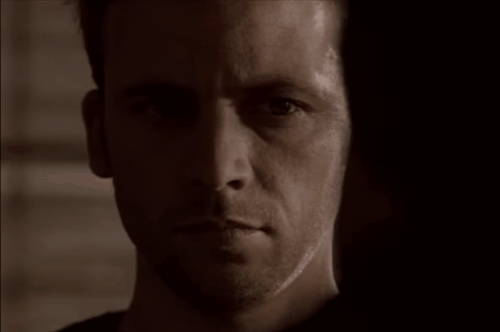

Conversations in closets and bathrooms:
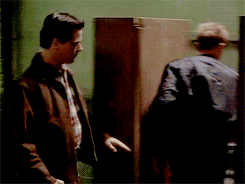
Going down with the ship

Intuitively understanding each other without a word spoken

His hobbies humiliate me in public
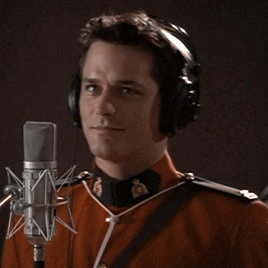
“Do you find me attractive?”
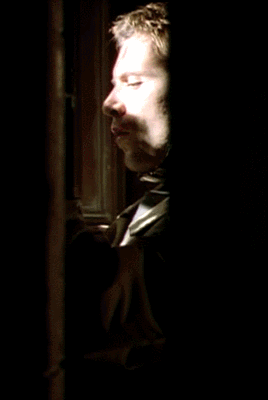
Sulking in the corridor while you reunite with your ex
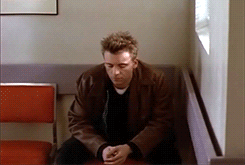
This whole ep with original Ray:
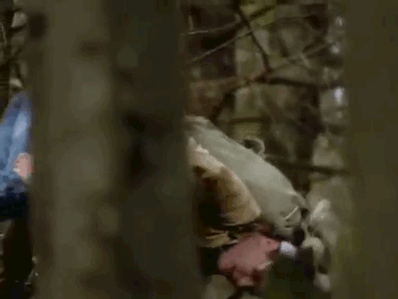
And his wolf approving of both

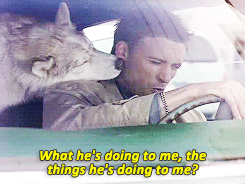
Not pictured “I love you” “And I you”, “Get out of the closet”, actual hand holding when it’s unnecessary, formally handcuffing your buddy, getting stuck in an ice crevasse and a mini submarine together–and so so much more. I invite you to watch the show if you can find it (I have it on a really nice set of DVDs, but there’s some dodgy ones out there that look like they recorded the DVD straight off a VHS, so do check reviews) or else try and find it online. There was a Canada promoting YouTube channel which published both due South and shows like Slings and Arrows, which I recommend as well (It’s not actually bury your gays if the ghost of your gay best friend haunts you, right?) so you should be able to poke around and find a legit copy somewhere. I’ve bigged it up and talked it down, and wandered a long way off topic (that describes my relationship with every show, but especially when I recommend them) but I hope somewhere along the line I also answered the question. The way I hear it Leverage is a similar sort of comfort food, though I haven’t seen it. Sounds like I should put it on my To Watch list.
54 notes
·
View notes
Note
Are you happy with Shiro settling down to get married and “leaving the battle” or whatever as his ending? Because I really thought he should’ve gone back to being a piloting instructor at the garrison and maybe staying on standby as atlas commander or something like that. He loved piloting too much to become completely disconnected from it and it feels like he never dealt with his trauma imo.
Short answer: No.
Long Answer: Somehow, this transformed into, “Obligatory Post-Season 8 Meta: Shiro is still the Black Paladin. No, I’m not delusional. Really.”
The Black Paladin & PTSD Treatment
It’s important to know, especially for @dreamworksanimation and @voltron, that someone doesn’t “get over” PTSD, as Lauren Montgomery said in an interview.
I’m not trying to be harsh or “call someone out.” I’m stating fact. According to the Mayo Clinic, PTSD symptoms can be treated by opening up to others and seeking the help one needs.
Getting timely help and support may prevent normal stress reactions from getting worse and developing into PTSD. This may mean turning to family and friends who will listen and offer comfort. It may mean seeking out a mental health professional for a brief course of therapy. Some people may also find it helpful to turn to their faith community.
This ties directly into Shiro’s story. In Seasons 1 & 2, Shiro hid the majority of his symptoms from the others. In Season 3 - 6, those symptoms were exacerbated by Haggar, and though Shiro reached out to Lance, he did not get the help he needed. Shiro then was attacked in battle by Haggar/The White Lion, and again, he suffered alone.
In “All Good Things,” the Void scene revealed that Shiro wasn’t as close to the others as he could have been, and that ended up being the truth.
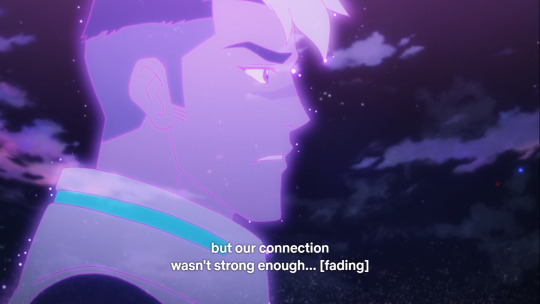
Like Allura never regained her confidence to lead, Shiro didn’t open up to the others and bridge that connection to strengthen it, which is one of the treatments for PTSD.
Here some of the Mayo Clinic’s advice:
You don’t have to try to handle the burden of PTSD on your own.
[…]
Spend time with supportive and caring people — family, friends, faith leaders or others. You don’t have to talk about what happened if you don’t want to. Just sharing time with loved ones can offer healing and comfort.
Shiro handled his suffering alone, and he did not reach out to family and friends. We didn’t see him working out with the Atlas Crew. We didn’t see him hanging out with the paladins. He was all alone.
This is also why “Knights of Light” is such a traumatic episode for Shiro fans and those struggling with mental illness. It completely dismissed all the suffering Shiro endured. The original paladins went insane in the Void. Shiro survived and came back stronger.
Even then, he went through the struggles in the Void alone. The paladins went through it with each other. That two-parter episode originally - I have no doubt - was for Shiro to open up to the others, receive support for his past torture, and even receive help from Zarkon, the original Black Paladin.
That’s why Shiro’s core fear - I’m too broken to be a paladin - focused on him returning from the Void, reconnecting with the paladins, and forming a stronger bond with the team. In this way, he would have begun to cope with his PTSD as the Black Paladin, proving he wasn’t too broken, and the story would have embraced the found family aspect, where Shiro and the paladins are truly “stronger together.”
Instead - Shiro was alone. Even in Atlas.

Even in Atlas/Voltron.
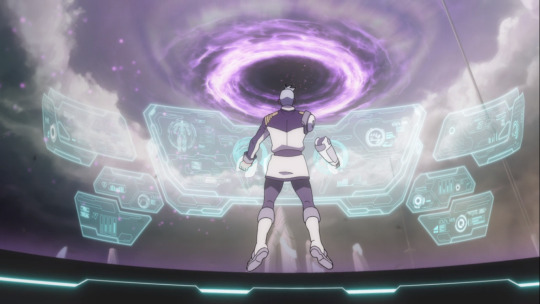
The rest are all bonded to their lions. We know from “Genesis” that the White Lion isn’t in Atlas with Allura’s crystals, thus Shiro isn’t the White Paladin.
Furthermore, the others don’t even speak to him in Voltron any longer.

He asks, but no one answers him. (There was one time that Allura responded, but that is only once. The only other time someone actually answered Shiro, it was Coran, who is not in Voltron.)
Throughout the season, there are instances of this. Here, Shiro and Keith are on the bridge, and they don’t even look at each other.

They don’t talk to each other. No matter how you see their relationship, they are important to each other. And yet…nothing.
Another time, Shiro was sad to be left behind when the team went forward. You can’t tell me he’s happy here.
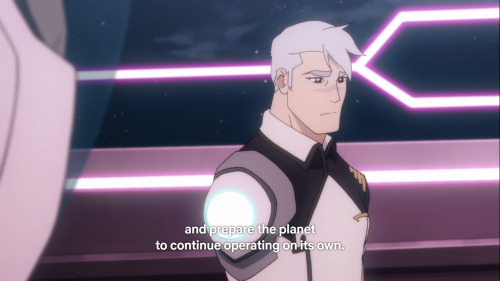
But Shiro desperately doesn’t want to be alone or left behind.
How do we know?
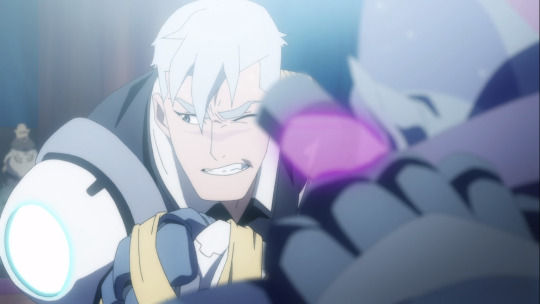
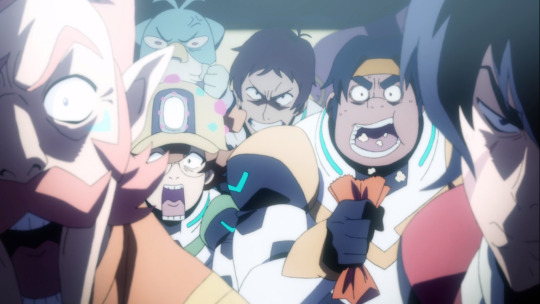

Shiro’s only win since Season 2 was an arm-wrestling competition, and he only won because he took strength from his one-time team. (Notice: Future hubby isn’t in the above shot.)
Shiro’s Marriage
Shiro is married, so he’s not alone, right?
Well, yeah, but…Shiro’s story wasn’t for him to be married off to finally have a family, when Voltron was supposedly a story about found family.
By Shiro’s happiness coming from marriage, Shiro was reduced to his sexuality. Shiro is queer and nothing else, but being queer is a part of someone’s entire person. If they would have shown Shiro “finding his happiness” on board the Atlas with no-name-dude with a tag like, “Shiro continued as the Atlas’ commander and found his happiness in space,” then fine. Do I still think it would have been random and forced, and all that?
Yeah. It’s 2018, and it’s baby steps, and I can’t believe there hasn’t been a mlm kiss in all of American cartoons already. But putting my own shipping preferences aside - it is progress.
However, Shiro’s core desire was to be a paladin, to help, to explore space. Say what you want about the paladin’s guardian spirits, but Shiro’s was the cosmos. Tell me again why Keith has a dog that can teleport and is called Cosmo? Oh, right. Cuz Shiro was supposed to be able to teleport.
Shiro enjoyed being paladin. He wanted to be a paladin, and if one wants to embrace his captaincy or admiralty or commanding office of the Atlas position - all right, but even then he was someone who wouldn’t leave behind the “good fight.” The good fight was where he wanted to be.
What’s also disturbing to me about “Shiro’s happiness” is that - it’s the ending Adam wanted. If you follow my blog, you know I wasn’t a fan of the “Shadam” pairing, mainly because Shiro and Adam wanted different things. That’s mature. That’s a good representation of an adult relationship. Each wanted something different, so they broke up and moved on. I like that DreamWorks showed that, and I wish they wouldn’t have killed Adam. It would have allowed viewers to see how relationships can have a healthy conclusion.
But for Shiro then to do what Adam wanted years later, leave behind “the good fight” and settle down, is a complete reversal of Shiro’s character. That also says Adam wasn’t enough for Shiro, but no-name-husband is. To be honest, if Adam hadn’t died, Adam could have filled that role, which is disturbing as well because Shiro is now “cured” of the degenerative disease, supposedly. (Technically, he’s not in the context of the story, but I’m ignoring that for now.)
So if Adam would have waited for Shiro, okay. But for Adam to want Shiro once cured, is a terrible message to those suffering from degenerative diseases. (Full disclosure - I was a caretaker of a person with a degeneration disease for sixteen years.)
Therefore, Shiro’s ending comes down to three things:
Shiro was married off because the EPs wanted him out of the story since the get-go, and if there is a sequel, Shiro is out of the fight - both the Black Lion and Atlas.
It was tacked on to fix the BYG trope in Season 7.
It reaffirms that Shiro is “old,” which the EPs just love to say, even though the dude is younger than me.
Shiro’s Role as the Atlas’ commander/captain/four bars
If one wants to say Shiro’s heads the entire coalition as a disabled man, which is empowering, I get it. That is a powerful position, though he hasn’t won a fight since Season 2. (The Alteans beat him up in “The Zenith,” and Zethrid’s Olkari tech is the reason the team wins in “Genesis.” In Season 7, the Atlas doesn’t beat the Altean mech, so Shiro in Atlas hasn’t won a fight by himself.)
But my argument is - Shiro’s core fear was not being worthy of being a paladin, and his position in Atlas proves his fear true. (Even though Altas and Voltron merged at the end, Shiro was still not a paladin - as I explained above.)
Also, it’s important to note Shiro was happy as the leader of Voltron and the paladin of the Black Lion. Plus, he was the garrison’s best pilot. (Keith was the garrison’s best up-and-coming pilot.)
Why would you ever sideline your best pilot? He’s one of your strongest fighters. He’s one of your best skilled fighters, and you take him out of the fight and put him on the bridge? That’s a terrible battle strategy. It’s like having the most winning goaltender in NHL history and taking him out to put in a no-name second-stringer.
What happens? The franchise collapses.
Yes, take that both ways, as I intended. After all, it’s no coincidence that Shiro was the Hot Topic exclusive Funko Pop! figurine.
Not only did the storyline sideline one of its stronger fighters, it continuously reminds fans of this and undeservedly praises itself for doing so.
Shiro had the strongest bond with his lion, and since the lion swap, almost none of the paladins talk to their lions. I think Keith is the only one who actually directs a comment to his lion - the “you’re back” line, in Season 8 and “I know you’re hurting,” in Season 6. The clone asked Black to trust him, but all the rest of the paladins refer to their lions and haven’t actually spoken to them in seasons.
Even the final moments of the paladins with their lions reinforce the original line-up, which does indicate that the lions and paladins haven’t spoken to each other because the lion-paladin bonds ceased to exist following the lion swap. In fact, I would go insofar as to say the lions themselves were not happy with the swap.
After all, Pidge and Lance never do the eye-glow thing, and Allura only did it with Voltron, not Blue. Also, Allura only used her bayard once in Voltron, in conjunction with Hunk’s. Neither Lance nor Allura ever use their bayards alone in Voltron, and also - the Blazing Sword does not return to Voltron until Zarkon is in Voltron with Keith.
So yes, according to “Knights of Life” - Keith is not the Black Paladin. Zarkon said Keith is a leader, not the Black Paladin, and Shiro, too, never told Keith in Season 2 to fly Black, just to lead.
Keith, Shiro & Leadership
Disclaimer: I love Keith. He’s my second favorite character, but I love Keith, not Keith acting like Shiro.
I wasn’t going to go into Keith and Shiro’s leadership dynamics, but after seeing this -
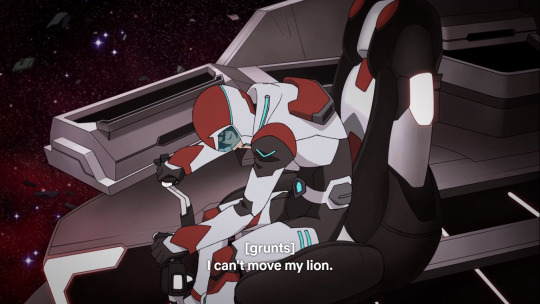

- I felt the need to touch upon it, as Shiro now reflects Keith in Season 2.
Keith’s leadership is based on two things - his race, as deemed by Zarkon, and two years on the back of a whale leading no one. (This is a story’s fault, not the character’s.) Keith’s connection to the Black Lion is based upon his relationship with Shiro, first asking the Black Lion to fly to save Shiro, then taking up the mantle of leadership because Shiro asked him to, and then again, flying Black to save Shiro.
Shiro, on the other hand, had the strongest bond with his lion, died to save the universe, was saved by his lion, existed in an environment that drove the original paladins insane, and came back to take leadership of an entire coalition.
Yeah, he’s just going to give up? And he’s not going to be the one talking miracles and getting up and moving again?
One can say, “But Keith has developed into the leader Shiro is/was,” which… okay, but then one has to also acknowledge, “Shiro has regressed after all he’d been through”
If one is discussing endgames for characters, this is a terrible place for us to say good-bye to Shiro.
Also, despite Keith’s insistence -

- it wasn’t. How do we know?
Allura died, saving the universe. In a universe where Voltron wins, it’s because the team is stronger together, and the team wins together. The paladins wouldn’t allow the universe’s survival to hinge upon only one of their shoulders. If Allura went to sacrifice herself, the other paladins would find a way to save her. They would talk her out of it. They would find another solution.
The Season 8 Voltron line-up cannot save the universe, let alone each other.
But with Shiro in Black, Allura in Atlas/the White Lion, Keith in Red, Lance in Blue, Pidge in Green, and Hunk in Yellow - we have a team that has saved the universe and a team that won’t let each other die.
We’d have a true found family that together, would win.
And Shiro would have found his happiness, in Black and in his family.
TL;DR:
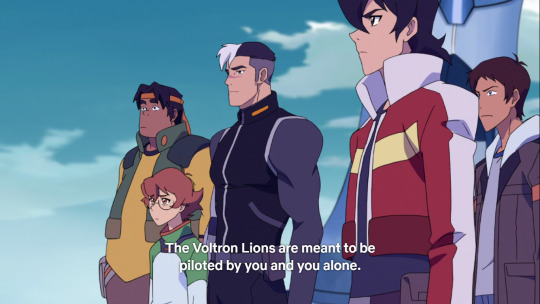
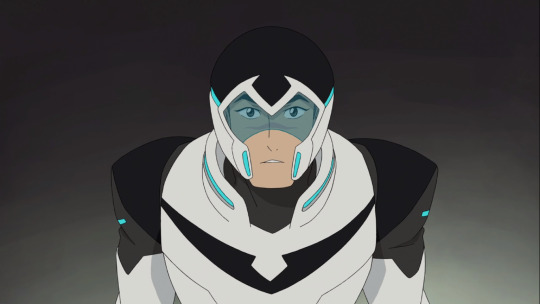
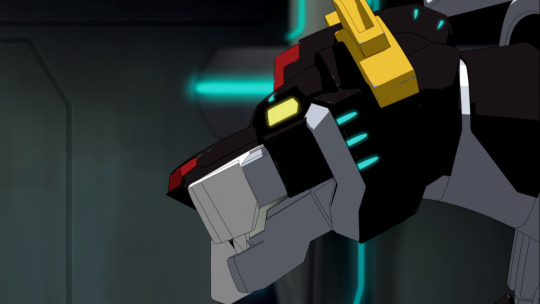
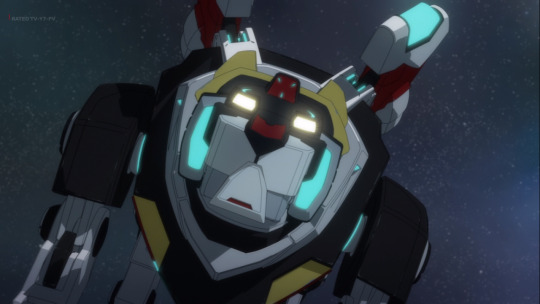

#voltron#vld season 8#shiro#onetrueblackpaladin#allura#paladins#vld#voltron critical#meta#keith#leadership#black paladin#atlas
517 notes
·
View notes
Note
Do you think if we take a step back we can view what happened w/the recent SW movie thru the lens of creative growing pains for Hollywood as they attempt to have better rep & inclusion? I haven’t been tracking this issue & don’t know if I have the life experience/perspective to say it’s true. But I am a member of the queer community, so I have seen that in attempt to have more rep on screen (which is progress), it seems normal that not everyone will do a good job & there’ll be a learning curve.
Obviously that doesn’t mean we don’t call creators out when they do something wrong! But for me even w/the SW movie ending bad I still see progress there. They’re changing the picture of who we see on screen. Who is important & explored in depth & fleshed out. They’re just bumbling the narratives & stories. Which makes sense if they’re not used to telling those stories. I think the right people being on screen is the 1st step. And/Or getting the right rep in storytellers behind the scenes.
Actually maybe getting the right storytellers bts is actually the key to what will take this move toward better rep and inclusion to the next level. Don’t get me wrong, like you I believe creators can tell thoughtful, nuanced stories about issues they haven’t experienced or communities they’re not a part of. But if they don’t have any of those people on their teams on in their ears, I think they’re taking a big risk and doing a disservice to themselves and the stories they want to tell.
+++
This is, I think, a very insightful question and something to look at. To be honest, it’s such a big question with so much IN it that I’m having trouble answering.
I think you’re right. That the current wave of “diverse” content, created mostly by white men, lets be honest, is problematic. And there are reasons for it being problematic... mainly telling a story that represents diversity when your life is... not diverse, is, well, really hard. And to get to that point where you can tell that story without falling to stereotypes and harmful tropes or cardboard characters is a process.
You can’t tell that story without doing a lot of work and really examining your view point. And ok, it’s not that ALL white men can’t tell these stories. Or that “diverse” creators (lgbt, poc, jewish, disabled or otherwise minority) are telling stories that AREN’T problematic. The truth is we live in a racist, homophobic, heteronormative, christian, ablist society. And it takes a lot of active work to rub off those layers of inherent bias.
I HAVE been watching this happen for a long time. And there has definitely been improvement in both representation of minorities in the media and people BEHIND the scenes.
I do think the key to improving representation in the media is to allow us to tell our own stories. Like for instance, while it’s not perfect, if we look at Witcher in comparison to Game of Thrones, you can TELL this is a story told by a woman. The writer of the book is male, but this version has a feminine voice. The way women are perceived. The way men are presented. Things that are valued.
Or like Ava DuVernay. A black director of A Wrinkle in Time, written by a white woman. You can tell that the voice in this story, is a WOC, and it’s NOT just because Meg Murray is portrayed by a black girl. It’s because the story sees black people as part of the human experience, rather than just an addition for flava and ratings.
Diversity makes the diverse people the subject of the story, rather than characters who are objectified as exotic poc of the day, or tragic lgbt movie of the week, or a terrible thing that must be magically cured because disabled people can’t be heroic. :/
I honestly don’t have the answer to this, except to keep telling our own stories, and to value the voices of traditionally underrepresented people.
I think that having white men, first, start writing us into their stories is a first step. It’s like we didn’t exist before? At first we get to be cautionary tales, like the old fashioned “tragic mulatto” where the beautiful passing part black girl is doomed by the stain of her heritage and ends up dying. We don’t really do that anymore. But we do see Bury Your Gays and the Dead Lesbian Syndrome, don’t we? Like maybe before we get to exist as “real” people, we have to show up as tragic, sad tales of how hard it is to be us. :/
Sometimes we get sick of all the stories about minorities being about how hard it is to be minority, and the terrible suffering we go through yadda yadda yadda. Ghettos and immigration and poverty and harassment. But you know what?
When we tell our stories, we find out they aren’t just about tragedy but about the full spectrum of human experience. Love AND heartbreak. Joy AND suffering. Struggle AND success.
I think also we’re entering a time when there’s some backlash from people getting to tell our own stories, and speaking up about how we are excluded. But maybe people who don’t really believe that our stories are worthy are still into, you know, killing us off in chains, or at the hands of our abusers or reducing our characters to grinning cartoons, or magically making our disabilities go away? And we start to complain?
Have you seen what’s happening with the Romance Writers of America? A writer’s organization that banned a half Chinese woman for complaining about racism in a woman’s novel? Yeah. THEY IMPLODED in the last two weeks. I watched it go down, because I follow the woman who was banned on twitter National news. They wanted her silenced. They said she was bullying when she questioned racism. Wow. It was. Wow.
They were working within the organization to make it more equitable and some people within the organization resisted. Because, you see, if we allow POC and LGBT folk and other minorities to tell their stories, we’re questioning the default humanity of straight white christian men. The closer you are to that center, the more social and political power you get, and having people ACTIVELY start telling non-white stories is threatening to the white men and Nice White Ladies because it takes away their dominance of what it means to be human.
There is bound to be backlash. And in a way, I think we’re deep into that backlash now. They’re starting to fight dirty. And what they’re doing is also obvious to a whole lot of us, because we see it now, where we didn’t before. When there was one Wonder Woman and we were glad to get her and we didn’t complain about her wearing high heels and a swimsuit.
Did I answer any questions? I don’t have answers. But this is very important to consider. Keep asking the questions.
4 notes
·
View notes
Text
What’s wrong with VLD?
This is gonna be a two-parter post expressing all my various frustrations with VLD, and highlighting exactly where I think it went wrong (all of them. yep). I’m going to keep it ship-neutral because ship discourse has a tendency to blind people and make them belligerent (myself included, I can admit that) however I will be discussing the canon relationships. This isn’t ship hate by any means - in fact I like all the canon relationships (or at least I like what they could’ve been) - but I think it’s pretty undeniable that VLD did not do them justice, and in fact took the worst possible route with them.
That said, let’s dive in.
(sorry to those on mobile, this is RIDICULOUSLY long.)
“Voltron: legendary defender” is a show that began with a whole lot of promise. Off the back of the (widely regarded as) almost faultless storytelling in A:TLA and the much celebrated queer ending of LOK (which resulted in a lot of writing issues being brushed under the rug but I digress), VLD was heavily anticipated, tapping into these shows loyal fanbase(s) - as a show produced by their alumni - as well as the market of older viewers, nostalgic for the Defenders Of The Universe cartoon they grew up with. It always had a lot to live up to, and when it dropped in summer 2016, it seemed to live up to the hype.
I personally didn’t join the voltron bandwagon immediately. In fact, I wasn’t even aware of it until around November of 2016. I was late to the LOK and A:TLA hype (very late actually. I first watched LOK around October 2016 and then doubled back to watch A:TLA) but got deeply invested and quickly followed several blogs with these interests. Through following these blogs, I kept happening upon the word “voltron” but didn’t pay it much mind.
Until I came across a post titled “HERE’S WHY YOU SHOULD WATCH VOLTRON.”
I decided to give it a read. The 4 key points of this post were:
A diverse main cast, with 3/5 of the main characters being confirmed POC, and a dark-skinned princess.
Focus on character and team dynamics, reminiscent of the A:TLA found family spirit.
Possibility of queer representation as suggested by the EPs, whom both worked on LOK, as well as the freedom of the Netflix platform.
Beautiful animation thanks to Studio Mir.
(Only one of those things ended up delivering in a convincing, satisfying manner. Hint: it’s the animation.)
These 4 points were enough to pique my interest enough to delve into the show and, after watching the first season in late November 2016, I was won over. I thoroughly enjoyed the characters, burgeoning dynamics and light hearted tone interspersed with deeper moments. Was it perfect? No. It was a little goofy. But that was ok, it had time to grow and settle. I joined the fandom and excitedly awaited the release of season 2, which came in January 2017.
This is where it started to go bad.
I will admit that, with the benefit of hindsight, season 2 is not as bad as I initially felt it to be. It struggles with pacing and balancing of the 7-character core cast, with several characters reduced to more one-note figures (namely Pidge, Hunk and Lance, although Pidge’s note as a genius is more flattering than the latter two). But story-wise, it is a solid season. The biggest problem of the season comes from the poor handling of the conflict between Allura and Keith over his galra heritage.
Allegories for racial discrimination are always tricky, especially in children’s media. They’re storylines that should only be tackled upon input from people that have experienced such discrimination, so that they may be handled with tact and grace. VLD season 2 did not do this.
What we got was several scenes designed to frame Keith as the victim of Allura’s aggression and intolerant nature. Bear in mind that Allura is a genocide survivor, whose entire race was (at the time of the season) believed to have been eradicated by Zarkon and the galra, whom had previously been her allies. Her emotional response is entirely justifiable and yet, through the framing of the conflict, the narrative was able to manipulate viewers into seeing her as the offending party, with many fans taking to social media to call out her “racism”.
To add to this, Allura is, in design, a black woman. Black women are often portrayed as harsh and aggressive, and VLD played into this to further sway support to Keith’s side of the conflict. He - a light-skinned boy of unspecified ethnicity - was often seen looking hopefully at Allura or looking down dejectedly. Allura, however, was shown glaring, ignoring and turning away from him. We are given an episode (Belly of the Weblum, S2E9) in which Keith talks to Hunk about Allura’s “hatred” for him, but we never see Allura expressing her hurt to a companion (ideally Coran as a fellow genocide survivor) or even lamenting alone. In fact, the only time we hear Allura’s side of things is when she is apologising to Keith (Best Laid Plans, S2E12).
More still, the entirety of BotW has Keith on the receiving end of several microagressions from Hunk. Microaggressions are “slights, snubs, or insults, whether intentional or unintentional, which communicate hostile, derogatory, or negative messages to target persons based solely upon their marginalized group membership”. Hunk’s prodding about Keith’s heritage, initial discomfort about being alone with him and joking remarks (e.g. “do you guys all know each other?”) are strongly reminiscent of microagressions that POC (myself included) encounter on a daily basis. Except, voltron decided to flip the script. This time, the microagressions are directed at Keith for being part galra. Remember that the Galra are the perpetrators of oppression, colonisation and imperial rule, making them allegories for several White endeavours in human history (space nazis, so to speak). And yet, voltron has the fat, dark-skinned boy (who would ordinarily be on the receiving end of such microaggressions in our world) be the perpetrator of these microagressions against the slim, light-skinned, space-white boy.
To sum up, their handling of the arc of Keith’s discovery of his heritage was extremely tasteless at best, and insidious at worst.
And the issues surrounding the writing of the Galra don’t stop there. Though Allura was treated as in the wrong for distrusting the Galra as a whole, the story makes you question whether this should have even been the case. Throughout the length of the show, the Galra are continuously portrayed as a violent and warmongering race. Their history involves conquering all the other races that called Daibazaal home and their most prevalent salute, “Vrepit Sa”, is revealed to mean “the killing thrust” (Omega Shield, S6E1). Proponents of the Empire will often declare “victory or death”, while their counterparts in the Blade of Marmora have a mantra of “knowledge or death”. Even more pertinently, Keith is a character with anger management issues, prone to aggressive outbursts. Instead of these being treated as a character trait, something that he has to work through, it’s chalked up to his “galra side” by the EPs. When he faces Clone Shiro (The Black Paladins, S6E5) he occasionally fights with more aggression, with the clone’s remark of “that’s the Keith I remember” implying that this aggression is a trait that has been present in Keith for a long time. This comes with the animation of Keith with tinted yellow sclera, narrowed pupils, purplish skin and fangs. All of these are traits associated with his “galra side” and all of these only make an appearance when he’s fighting with more aggression.
So how is it that the narrative repeatedly shows us that the Galra are an inherently aggressive and violent race (which is such a problematic concept anyway: they’re not wild animals, they should have agency and self-control), yet also tells us that Allura was wrong for not trusting them?
It’s because the narrative was dead set on punishing Allura.
Throughout the length of the show, we see Allura put through emotional punishment time and time and time again. She is portrayed as wrong for her behaviour towards Keith in season 2 (as detailed above). In season 3, she is explicitly stated to be the “decision maker” (The Red Paladin, S3E2) then is swiftly demoted from that position (and yes, it’s a demotion, but more on that later).
In the same season, the team enters an alternate reality (Hole in the Sky, S3E4) where they find alteans, alive and well. This is especially exciting for Allura (which genocide survivor wouldn’t be thrilled to find their people alive and thriving?), but her joy is short lived when, after she helps the alternate alteans, they are soon revealed to be evil, arguably moreso than the galra in the main reality as they use technology to enslave races that oppose them by taking away their free will entirely. The comet ore that they manage to keep out of the Alteans hands to prevent them from making a second voltron is quickly snatched from them by Lotor when they return to their own reality. Allura laments that she “finally understands” why her father, King Alfor, scattered the lions: it was to prevent this reality. However, in the pilot episode (The Rise Of Voltron, S1E1) Allura spoke with King Alfor’s AI, complete with all his memories. The AI told her that she had in fact been right to want to keep voltron and fight the Galra, and he had been wrong to send them away. If he had sent them away to “prevent this reality” why didn’t the AI say that? HitS retcons Allura’s rightness in that call, further devaluing her judgment. How would Alfor have sent the lions away to prevent the reality where Lotor gets the comet ore, when Lotor wasn’t even born when Alfor died?
This tendency to punish Allura continues with Allura’s relationship with Lotor. When Lotor is first taken prisoner by team voltron (The Prisoner, S5E1) Allura doesn’t trust him at all. He asks her to see past his Galra race and, following her arc in season 2 of not seeing galra as an evil monolith, Allura eventually does. She works alongside Lotor even before discovering that he has Altean heritage. Eventually, they fall for each other and Allura is on cloud nine for a while as the war seems to be over and she is spending more and more time with Lotor, who encourages her, praises her and helps her connect more to Altea. So, of course, this doesn’t last for long. Lotor is revealed to have been manipulating Allura (and the others) all this time, using her to upgrade his Sincline ships while secretly using Alteans he found in the diaspora as batteries.

(Pictured: Lotor holding Allura’s hand in Bloodlines, S5E5. She agrees to help him search Haggar’s den and during this search, learns of his Altean blood.)
So, what was the need of this relationship? She was punished for not trusting the Galra, and then punished for...trusting the Galra. She clearly could not win. And why was it necessary to have Allura fall for Lotor, only for it to end on such a terrible note? Why did their relationship have to be romantic? Was it simply so Allura would feel the pain of his “betrayal” that much more? Because it sure comes off that way.
There are so many scenes of Allura breaking down in tears - Crystal Venom, The Red Paladin, that one episode in s8 that I can’t remember that has her crying bc Sincline was about to kill Lance, probably more - and she is constantly giving up pieces of herself and her heritage. In the very first season, she heals the balmera (Rebirth, S1E8) at expense to her own health. Through the length of the show, Allura continues to risk her life to protect others. She desperately wants to maintain connections to Altea (hence her joy at the alternate alteans, as well as her close bond with Lotor) yet she is constantly losing every connection she has. She has to destroy her father’s AI, the alteans turn out to be evil, Lotor turns out to be evil, they blow up the castle to save all of existence, she gives up the jewel from her crown (which she never took off) to save shiro, and then ultimately, she dies to save all realities (because...reasons). One would have thought that her arc would involve being less self-sacrificing, but no. Allura is tortured emotionally, loses everything she cares about and then dies.
On a similar note, while Allura was constantly put through emotional torture, Shiro was constantly put through physical torture. There are several pieces out there by people far more eloquent than myself that detail the constant use of Shiro for torture porn throughout the show so I won’t rehash them. I will say that, like Allura, his torture does not culminate in a satisfying ending that made all his suffering “worth it”. Throughout the first and second seasons, we see Shiro bond closely with the black lion. He battles Zarkon for control (Space Mall, S2E7) and almost fails, until he realises that “nobody controls the black lion” and this galvanises the lion to take action and save him, severing zarkon’s bond. In the final episode of the season (Blackout, S2E13) Shiro and the black lion connect more deeply than ever before and we are shown a montage of all their bonding moments, leading up to Shiro unlocking the black lion’s wings, which enable them to phase through Zarkon and collect the black bayard, a plot point introduced in the very first episode. After seeing Shiro work so hard to earn the black lion’s trust, forge a bond stronger than the one that lasted 10 thousand years, and triumphantly collect the bayard, his fans would be understandably excited to see him use it. But he never does. After all that hard work, Shiro never sits in the black lion’s cockpit again. His clone does for a while, but Shiro himself does not, and he never touches the bayard again. This is a huge disappointment to his fans, after 24 (technically 26) episodes of buildup to that moment.
And to add insult to injury, it’s never explained why he doesn’t. The EPs said in an interview that when Allura unmerged Shiro’s quintessence from the black lion, she also broke their bond. But this explanation comes with a number of issues. Firstly, this is never stated in canon. Viewers should not have to rely on extra-canonical material to get a full story. Extra-canonical material should be supplementary, an opportunity for eager fans to learn more about the universe and the characters. It shouldn’t be a requisite to understand the story. And, believe me, this information was. When I was watching season 7 with my (at the time) 10 year old brother, he turned to me and asked me why Shiro wasn’t flying the black lion now he was back. I shrugged and told him I didn’t know. I, in fact, did know the EPs explanation, but I wasn’t going to do their job for them. Secondly, the explanation falls apart upon the slightest examination. Say Allura did remove Shiro’s bond with the black lion (somehow...because that doesn’t even make sense). In the pilot, Allura says that “the quintessence of the pilot is mirrored in his lion” and this is why they can bond and fly together. Well, Shiro’s quintessence hasn’t changed, as Allura simply extracted and transferred it. The black lion’s quintessence hasn’t changed since nothing happened to make it change. When they first met, Shiro and the black lion didn’t have a bond. They formed and strengthened that bond upon flying together. So, why can’t they do that again? What is stopping Shiro from simply sitting in the cockpit and restoring their bond?
Short answer: Keith.
Long answer: the EPs desperate desire to have Keith in the black lion at all cost.
Keith was the leader of voltron in DOTU. This isn’t news, we all know this. Keith has also been the leader in every iteration since. This means that Keith has always flown the black lion. VLD following this trend makes sense, right?
Well, no.
Other iterations of voltron always begin with Keith in the black lion. They don’t shuffle him there later, they start with him there. Keith is always the strong, sensible, heroic figure that makes him perfect to lead the team, so he does. VLD strayed from that, and that makes all the difference. In VLD, Keith is introduced as a loner with a temper. He’s closed off from the team, only displaying affection for Shiro. This makes him unsuitable for the leadership position at the time of inception. Does that mean he can never lead? No. He can absolutely grow into leadership. But the problem is, the show already presents us with a valid position for him: the red lion. In the red lion, Keith’s fiery nature, intuitiveness and fast pace are positives. He’s allowed to stretch his legs, flying in the fastest lion and doing cool stunts, then returning to the team when necessary. He doesn’t have to change the core of who he is. Additionally, he is shown to have abandonment issues, hence why he clings to Shiro so tightly. It seems fitting then, that the lion he is matched with is the only one that comes to save their paladin so often, retrieving Keith on five different occasions (S1E1, S2E6, S2E8, S2E11 and S2E12) and even across several galaxies.
In previous iterations, the lions are not given personalities, nor do they demand unique traits/quintessence from their pilots. They’re just ships. But in VLD, Allura tells us in the pilot that the lions are meant to be piloted by these five alone. Their quintessence is mirrored in the paladins as she assigns them. They are perfect matches, just like with red and Keith. Hunk is fearful and Yellow has superior armour. Pidge is brilliant and Green is inquisitive. Lance is insecure (especially in relation to Keith) and Blue is nurturing, but more importantly, chose Lance out of all 5 pilots available (Keith visited the cave several times but blue didn’t take him. She waited for Lance). And Shiro and Black are both strong leaders that suffered from trauma and struggled for control over themselves.
Naturally, when you begin a story with a perfect fit, you want to shake things up because conflict begets growth. However, shaking things up shouldn’t cause them to end up in a worse place than they began because the question becomes: well, why don’t they just go back to where they were before? And that’s the big question in vld. Why didn’t they go back?
So, ok yeah. I think the lion swap is trash.
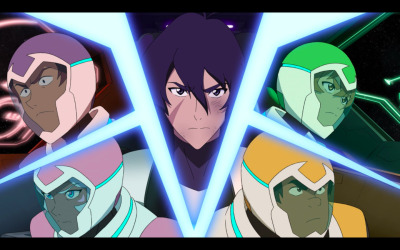
(Pictured: splitscreen of the paladins minus Shiro in All Good Things, S6E6. They form voltron with Keith in the black lion, Lance in the red lion and Allura in the blue lion.)
Now, like I said, you want to shake things up because conflict begets growth. And for that reason, I don’t think the lion swap was a bad concept. Putting Keith in the black lion forces him to learn to work with his teammates instead of remaining a lone wolf. Putting Allura in the blue (or any) lion brings her closer to the paladins. Lance and the red lion could have easily been the most interesting switch. In the pilot, the first major thing we learn about Lance is that he only got a spot as a fighter pilot because the best pilot of their generation had a discipline issue and flunked out. This student happens to be Keith, and Lance has a lot of insecurities about the guy, instigating a rivalry with him (mostly one-sided but Keith shoots back with his own barbs too). Coming back to the lion swap, the red lion is Keith’s old lion. There was a wide open opportunity to explore Lance’s insecurities here, as he would once again be stepping into the pilot role that Keith left behind. Lance could have felt that he would yet again be in Keith’s shadow (as Keith has now levelled up to leader) and this could’ve caused some major conflict. But nothing was done with it. Lance simply makes a comment about how Keith “probably trained it to bite my head off” and that’s the end of that. Lance then has no qualms about flying red and his Keith related insecurities (and indeed, all his insecurities that aren’t about romance) are brushed under the rug and he props Keith up as “team leader”.
Personally, I think each of the characters affected by the swap should’ve had a mini-hero’s journey. The characters start in their original lions (the castle for Allura). In their original position, they have whatever issues it is they need to tackle (Keith’s lone wolf tendencies, Allura’s self sacrificial nature, Shiro’s trauma and sense of worth, and Lance’s insecurities). When the swap happens, they struggle with their new positions, but are forced to grow. They then take this growth with them when they return to their original positions as wiser individuals (Shiro knows he isn’t a monster, Allura learns that the weight of the war against the galra isn’t entirely on her shoulders, Keith comes to trust and open up to the team and not only Shiro, Lance realises that he isn’t a discount Keith and he has his own strengths).
But the wasted opportunities aren’t the only problem with the lion swap. Arguably a bigger problem is the hierarchy it suddenly establishes. The concept of voltron is five equals coming together to form something that is greater than the sum of its parts. They cannot form voltron if even one of the lions is indisposed. So, by definition, all of the lions should be equally important. The black lion being the leader shouldn’t make it the most important, it should just be because every team needs someone to organise them and black happens to be that for the lions, just as Shiro was for the paladins. After all, of what damn use is voltron with only a head and torso? No, all lions should be equal.
But they aren’t. When Keith moves to the black lion, Lance moving into the red lion is framed as a promotion. Allura says that it is because Lance put his need for glory aside when accepting Keith as leader and this somehow passed the red lion’s test, but what about the others? Did they put their needs for glory first? Did Allura? Why was she unable to fly the red lion? The EPs said in interviews that the blue lion is the nurturing lion and is like a mother bird that pushes her baby out of the nest when the baby is ready to fly, suggesting that she pushed Lance to red because he didn’t need her anymore. They also refer to the blue lion as the “training wheels lion”, implying that those who fly the blue lion are not yet ready to fly a real lion. What does this say about Blaytz, the previous blue paladin? He was the leader of his planet, yet he spent his entire time in voltron in the training wheels lion? And, more pertinently, what does this say about Allura? It completely infantilizes her and is absolutely insulting.
Ultimately, the downgrading of the blue lion to a training wheels lion and the sudden insistence on the red lion being the right hand man to the leader establishes a hierarchy of Black > Red > Green/Yellow > Blue. Allura used to be the decision maker. In the pilot, Shiro says “Princess Allura, these are your lions, you've dealt with the Galra empire before. You know what we're facing better than any of us. What do you think is the best course of action?” From the very first episode, Shiro (who is already the leader of the paladins) defers to Allura. She was their commander, calling all the shots, superior to even the black paladin. But once she steps into the blue lion, she loses that rank. She falls to the bottom of the totem pole. Taking a dark-skinned woman and putting her in a powerful position, only to strip her of that and relegate her to the bottom (mind you, it only becomes the bottom when she gets there), is either the height of ignorance or deliberate malicious intent.
In fact, the lion swap leaves us with a very uncomfortable set up. With the establishment of the hierarchy, we know that the head is superior to the arms, which are superior to the legs. Well, the head happens to be the space white (arguably earth white too - his ethnicity was never revealed, possibly because they knew they would lose support if they countered the popular Asian Keith headcanon) male character. The arms are the white female character and the brown (but lighter brown) male character. The legs are the darkest-skinned characters.
At the end of the day, VLD was racist. Plain and simple. The characters of colour that remained in voltron were short-changed terribly, and Shiro was shuffled off onto the atlas because they weren’t allowed to kill him.
I mentioned how pretty much all of Lance’s insecurities were brushed under the rug, save for one: romance. From the very first episode, Lance displayed a crush on Allura. He flirted with her incessantly, to constant rebuffs but remained undeterred. In the 3rd season, he suddenly stopped flirting. He and Allura developed a friendly and mutually encouraging rapport. It was sweet. They were sweet. But then everything changed when the fire nation attacked Lotor arrived. Despite Allura and Lance’s continued sweet moments, Allura fell for Lotor. She didn’t shun Lance or anything, and she certainly still valued and cared for him greatly, risking her life to save him (Omega Shield, S6E1). But she didn’t see him romantically. How do we know this? Because when the mice inform her of the depths of Lance’s feelings for her (Timey Wimey ep, sorry idk the name, S6E2) she is initially surprised, but then sad.

(Pictured: Allura’s face after the initial surprise of the mice recounting what Lance told them about his feelings for her in S6E2. This episode comes before the one where she and Lotor share a kiss.)
It can be argued that she’s “conflicted” and not sad, but I personally don’t see that. I just see sad. But even if she was conflicted. Even if she did have romantic feelings for Lance by this point, her feelings for Lotor were stronger. We don’t see her torn between the two men. We see her consistently choose to spend time with Lotor and kissing him despite knowing how Lance feels about her. Whatever potential romantic feelings she may have for Lance, they weren’t enough to deter her from choosing Lotor. That is inarguable.
So after totally ignoring all other aspects of Lance’s insecurities, the narrative then validates the only one left by confirming that, yeah, he is the second choice. And I know people love to argue that just because he isn’t Allura’s first kiss doesn’t mean their relationship isn’t valid and obviously this is true. I’m not saying Allura can’t kiss more than one man in her life or she’s some sort of impure slut. Of course not. What I am saying, is that we know that Lance has insecurities pertaining to being second choice. He is insecure because he’s been told that he only made fighter pilot because Keith messed up. Well, guess what? He only became Allura’s boyfriend because Lotor messed up. He’s in the same situation all over again. Allura knew her options and made her choice. When that choice was no longer viable, she went for the other option. The narrative confirms Lance’s inferiority. There are so many other ways this could’ve been handled. For example, if Allura and Lotor had been spending a lot of time together working on the ship, and it only looked like they were dating, that would’ve been fine. Finding out about the colony would still have been heartbreaking for Allura because she trusted him. As another example, if Allura had feelings for both men but chose Lotor because she felt it was almost her duty, to secure a stronger alliance with the empire, that would’ve made the ultimate endgame with Lance more believable. Or, if the mice simply never told her how Lance felt and she didn’t know he was still into her. Or if they even had one moment after the colony reveal (The Colony, S6E4) where Lance did or said something and Allura was shown to be considering him romantically, before she walks up to him in season 7 all blushy and stammering (I don’t know s7 episode names but it’s there, I think it might be s7E10). That moment seems to come out of nowhere because all of Allura and Lance’s scenes that can be interpreted as romantic on her part occur before she kisses Lotor (and no, Lance comforting her in S6E5 doesn’t count because she’s literally crying on his shoulder over another guy. That’s not romantic. Her comforting him in S6E7 doesn’t count either because it’s essentially the same day as the colony reveal and there is no way she’s believably gotten over it that fast. Also he’s literally crying over their dead friend’s body. Nothing says romance like a corpse, amirite?) so we’re left wondering: when? When did she start liking him back? Which is a shame, because a relationship built on mutual support is a wonderful thing to show. VLD just didn’t show it well.
The buildup to relationship fails Allura just as much as it does Lance, because it appears as though she is being punished (yet again!) for making the wrong choice. She had the options of Lotor or Lance and she chose Lotor. And her reward for choosing Lotor is discovering that he neglected to mention the tiny fact that her people are not eradicated and he’s been using them as batteries all this time. A lot of heartbreak would’ve been avoided if, upon finding out about Lance’s feelings, she’d just chosen him directly instead of going through the Lotor thing first. Because she learnt nothing from that experience that required that she kiss him. There was no need for her to have romantic feelings for Lotor; after all, he needed her magical abilities so it’s not like they wouldn’t have gone to Oriande anyway. So what was the need to put her through that heartbreak When her romantic endgame was already available, willing and able? It ends up just feeling like someone working on VLD once had a crush on a girl who chose a suave bad-boy type over him, and he’s reliving it through this cartoon by showing how the bad boy type is actually just using her and she should actually have chosen him (my guess is JDS but that’s just me).
Continuing on the topic of romance, Shiro’s relationships are a mess. From the whole ordeal with Adam, his death and the 5 seconds of mourning Shiro was allowed, to Curtis’ name only coming up in captions and he and Shiro never actually having a conversation before getting married, it’s pretty clear how little effort was put into queer representation. The EPs knew how desperate the fans were to see queer rep and they played on this in interviews and at panels, stringing fans along with hope to see at least one queer main character and couple. But they never intended on fulfilling that. Several sources reveal conflicting information on how and when Shiro being queer was decided, with some sources saying it was Bex Taylor Klaus that asked for it, some saying it was a recent development and some saying they’d been sitting on it for a long time. In fact, the EPs themselves claim they’ve been sitting on the knowledge for a while, but with their awareness of the “Bury Your Gays” trope, they considered making somebody else The Rep™️ (because y’know. They wanted to kill Shiro. They have been very vocal about wanting to kill Shiro. Also The Rep™️ because heaven forbid you have representation for marginalised people in more than one character, right? Can you imagine having TWO WHOLE QUEERS? Scandalous!) but when their higher ups informed them that they were not to kill Shiro, they decided to make him The Rep™️ again. If this is true (and that’s a big if) one must ask: if they were aware of the “Bury Your Gays” trope, why did they do it anyway? And TWICE for that matter (thrice if you include Shiro’s death and resurrection. That’s right, shiro is Jesus).
They killed Adam supposedly to show the casualties of war, but we’ve only ever seen Adam once and it was during his and Shiro’s breakup scene. Of what emotional value is he to us? To show the emotional stakes, killing Sam would’ve made more sense because we’ve at least met the guy and we’ve seen how much Pidge loves her dad. Adam was barely a character. In fact, my brother didn’t even know we had ever seen the guy before when I paused during his death scene and asked him who that was (he said it was just some random pilot we’d never seen and had no idea what I was on about when I said it was the guy shiro was arguing with in the first episode). So frankly, I don’t care that Adam died. I only care that Shiro is yet again on the receiving end of the VLD stick of pain, and that a queer character was killed for no good reason. And Ezor is only alive because of the backlash after season 7 (sidenote: well done y’all. Making your voices HEARD and getting change is a beautiful thing). Yet another queer character would’ve been killed off unceremoniously if the EPs had their way.
I could go on forever about how much this show fucked up but I’m actually getting tired of thinking about it so I’m gonna summarise the next few issues in another post.
PART 2
#finally posting this#hoo boy#i have A LOT of thoughts#i've been sending snippets of this to friends whenever we're talking about one specific issue#but here it is in its entirety#well part 1 of its entirety#vld critical#a pinch of salt#vld#voltron#long post#voltron legendary defender#more like#voltron legendary disaster#or#voltron legendary disappointment#whats wrong with vld
33 notes
·
View notes
Text
My ask box continues to fill up, and I have no answers for any of this. I’ve gotten comments that @dreamworksanimation is good about things like fair representation in other shows when it comes to disability, queer relationships, racial diversity, and just plain solid storytelling. Why was @voltron the exception?
Or you can just have the questions from my asks:
I really, really wanted [Dreamworks execs] to address the situation, to tell us why VLD took that enormous shitty turn and to apologize and do us better. But I'm guessing we already know the answer (arrogant inexperienced EPs) and I think they won't do anything about it, just try to fade Voltron to the background as it's ending and focus on She-ra, if they ever decide to apologize, they're just gonna focus on the LGBT rep as if its the worst problem of their story.
You know what, I hope someone makes an extensive list of all the morally questionable messages Voltron has sent with all its characters (Shiro & Kuron everything, and Lotor as abuse victim in particular), all in detail and shove them in their faces saying, but to you it's 2 guys in love and in a healthy relationship that is wrong, instead of ableism, racism, homophobia, etc. When I think of what the kids will take from Voltron I feel sick. But queer love is the problem here, right. I’m disgusted.
Us: can we get a happy ending too like the het people and couples in the show?
VLD: no, not a happy or even semi-happy ending, you'll get a miserable ending but get this, we're going to write the last survivor of the 4 queer characters we killed off to be totally on board with this. We'll write him and animate him as if he's happy and got resolution, growth, and catharsis and not as if he got demoted, sidelined, isolated, discarded by his family, worst of all by Keith. We'll say a monster like him can’t be a paladin.
Let’s also go back to talking about how they not only made Lotor, a victim of child abuse not to mention biracial character who grew up with everything against him: suddenly evil, be the same as his abusive "father" and "mother" (who even after remembering who he is pulled the same crap as before), took every happiness away from him and had the nerve to mock his abuse in S7?! As a child abuse survivor I'M HORRIFIED.
The messages in the Shiro/Adam scene is disgusting, this is such a difficult subject, even for adults show with plenty time to explore and be fair to both characters while being explicit about it all. I was worried: in a kids’ show? how can they write this in a way they'll get it? With barely time for it? but look what they wrote, Adam gave an ultimatum instead of support and died, then they blamed the disabled guy for everything. Message: you’re gay so your relationship and your life are worthless, you'll be miserable and alone.
For a team that is all about working together, voltron members after 7 seasons still don't feel like a family and more like colleagues from work. ¯\_(ツ)_/¯
It feels odd knowing that they weren't actually battling homophobic higher ups. It feels more tactical and greedy for social justice points than out of genuine desire to showcase diversity. Is it coincidence that the character they dislike the most is the one selected for this honor? As a lesbian fan i'm skeptical and angry and refuse to watch anything else by these two.
People keep trying to excuse this stuff with "Voltron is a kids' show", but you know what? There are gay kids out there. There are disabled kids out there. Much as we may wish it otherwise, there are kids out there experiencing trauma. Do we REALLY want to teach those little kids that they are broken and tainted forever and nothing good is waiting for them in the world from here on out? People need to know how damaging it is to have ZERO stories in media showing realistic healing of trauma.
The lady who betrayed them got a proper send off scene even tho she send Adam & the others like pigs to slaughter & betrayed them & caused them all to almost lose and die. Got screentime & some characterization. But sure why respect Adam that way too. I will never forget the dread I had for him when I saw he was with the fighters who were sent to die, then watched them one by one lose their lives until he too, was killed. I still feel sick thinking about it. We never even learned his last name.
I know it's been a while but I'm not over how they treated Lotor in s6. I'm from a broken and dysfunctional home and this show I watch for escapism told me I'm doomed to repeat the same mistakes of my parents, end up just like them. ... Are they even aware of the messages they send to their audience? Not all of us had good childhood like Allura.
From a chronically ill perspective, I felt downright insulted by the choice they made to give Shiro a degenerative illness. The idea of a chronically ill hero is cool but they pull the cure narrative, they don't give him a real illness, and it's just used for cheap irrelevant drama. Plus the whole "Has to choose between loved ones and goals" thing was pretty insensitive, we're already expected to sacrifice so much as ill people so the reinforcement of that was unpleasant to watch and read meta on.
Even if everyone was white cishet abled guy the messages sent to kids were awful: One who fought to carve his own path was forced to become someone else, one who suffered and fought till the end was told he’s a monster that can’t be a paladin, the insecure one will never be worthy as himself and he'll always be someone else’s replacement, one who survived genocide and suffered loss upon loss until reduced to nothing, one who suffered by his parents’ hand became like them, the whole Kuron thing. You cant brush off all THAT.
going into the new semester with the horrible messages of s7 on my mind...i’m lethargic. i have been since the “retired paladin” interview. it was bad for me to balance my mental health on the state of a fictional character, but it was really effective. Until that awful message that disabled people are helpless in controlling their own lives. I’m trying to disconnect and thrive anyway, out of spite against ableism if nothing else.
I had this horrible realization: you know how Shiro is a victim of abuse and him getting the Black Lion was him regaining the control the lack of he suffered in his capture? I think they gave him the illness and handwaved it with the clone, so as to argue for his removal from the Black Lion. They claim that the reason he wanted control was the illness and not the victimization in the Galra hands. They're essentially erasing his trauma.
Writers: so we'll write endearing multidimensional characters with many layers, we'll have them subvert stereotypes, especially those that characters like them usually are written with, ie. Keith isn't a loner nor is he angry just 'cause, but a lonely abandoned kid with trust issues due to his mom leaving him, thus has poor emotional control and anger management, struggles to connect and open up, he is the one whose arc embodies the found family theme more than anyone.
EPs: nah we want stereotypes loool
We talk about Shiro and all the ableism in his story but we don't talk nearly enough about how horrifying the message is that Keith is the one to take it all from him and kick him aside. Keith chose to discard Shiro because he's broken and useless, so he can take his place. I've been through things they both have and I find all that horrifying. S7 sent terrible messages to kids watching.
They had the chance to let Shiro overcome and be a hero. To defeat his own abuser (Sendak) except Keith takes over everything and fixes everything for him while he lies helpless on the ground without a new arm yet. They had the budget. The animation. They could have empowered Shiro. They saw how many people saw themselves in Shiro's struggle. They must have seen the concerns. And they actively chose to go against that.
The Bury Your Gays trope is even worse this season when you consider the heavy lesbian subtext with Lotor's former generals who get blown up on screen. And naturally, it's the one with a crush on Keith who turns good and survives.
Was there a minority that hasn't been screwed over? Bury Your gays was merely the last shocking straw, because the whole season was chockful of terrible messages and proved they would never treat their characters right and address stuff from before. Homophobia, racism, ableism, sexism, mocking of abuse, excusing abandonment & so on.
I’m adding my voice because I'm so, so tired. None of the characters i see on screen are the characters we got to know in s1/2. The character i most related to was beaten down out of spite for 4 seasons and now may as well be a cardboard cutout. DW and the EPs don't seem to give a single shit about how badly this season has affected people. i don't know whether to jump ship or spit fire over everything. i'm just... exhausted.
I want a transparent statement & apology from DreamWorks. I want to know THEIR stance & role in this, ALL the events that ended up with us getting a show that is not only homophobic but also ableist, racist, mocks child abuse and so much more. I want them to acknowledge & explain why they allowed the marketing team to bait fans with ship content in their videos, thumbnails and even that EP interview about shipping. I want to know who and why allowed the show to to take a worse direction in recent seasons.
I have no answers for any of this, @dreamworksanimation. If there are any explanations, any reassurances that you’ll work hard to prevent any repeat, you need to say so. The longer you’re silent, the more it looks like you’re fine with the story and all its horrific messages. Are you?
130 notes
·
View notes
Link
“I don’t know if there is some kind of EGOT (Emmy, Grammy, Oscar, Tony) equivalent for reality television but, if there is, Courtney Act is already making her acceptance speech. The gender-fluid drag queen first showed up on the small screen in 2003, auditioning for Australian Idol as both stage persona Courtney Act and out of drag as Shane Jenek. You Won’t Believe Which Contender Made It Through.
Since then, she’s graced RuPaul’s Drag Race, Celebrity Big Brother UK, and is currently doing truly spectacular jigs on Dancing With the Stars Australia. As of tomorrow, you can also find her hosting The Bi Life on Bravo. Following a group of bisexual singletons stumbling their way through awkward first dates, the show feels casually revolutionary without ever being sensational. Ahead of the premiere, I had a chat to Courtney about getting her message across in the most unlikely of mediums.
At what point in The Bi Life did you get involved and what did you make of the concept?
It was actually after Celebrity Big Brother in the UK that I had a few different reality shows on offer to me. It’s funny, people always ask me ‘why did you do Celebrity Big Brother?’ and I’m just like, ‘because they asked me to!’. But The Bi Life genuinely seemed to be the right fit for me because it was on these mainstream networks but had these strong queer themes which I’m very much about.
When you watch it, there’s something for everyone. If you’re straight, you’ll see people of the opposite sex going on dates. If you’re gay, you’ll see same sex people going on dates. If you’re bi, you’ll see people just like you. There’s also the fact that the B in LGBT is the largest percentage of the acronym but still the least represented.
What are some of the misconceptions about bisexuality that people still hold?
It’s fascinating because I think a lot of gay men still don’t think that bisexuality is real, because they might have come out as bi on the way to coming out as gay. Even my brain used to try to do the same thing, I’d see a guy on a date with a guy and assume he must be gay. But here’s the thing, my brain, when people tell you who they are, you should just believe them.
I think that’s why shows like The Bi Life are important, because they reduce the mystery around people being attracted to more than one gender. When you see it play out on reality TV, it’s just a matter of fact that there’s a guy going out with a girl and then going out with a guy. Being straight and being gay doesn’t have anything to do with your masculine or feminine presentation – it’s all about who you are attracted to and who you want to sleep with.
That’s what I liked about the show, because there’s none of those heteronormative reality tropes – the virgin, the idiot husband, the slut etc – it feels like a totally clean slate for people we’ve never seen.
Yeah, we really wanted to show as much reality and as much truth to their experience as possible. It’s really easy to create those reality tv tropes and sensationalise everything, but when you’re telling a queer or minority story in the mainstream, you have to be so much more mindful. For example, if you see a white heterosexual man behaving badly on a TV show, you don’t assume that all white heterosexual men act like that. But when it comes to minorities in the mainstream acting a certain way, people tend to more readily tar everyone with the same brush.
I don’t think queer storylines are quite at a point yet where we are being be viewed as individuals and not a collective, so we were very aware of being as careful as we can telling the individual, unique stories.
How do you feel about the role of reality TV in breaking new ground for representation?
Well it’s certainly done that for me and my career, it’s given me opportunities I never thought I would have. I think because it’s often down to trial by public, producers are more willing to take casting risks – if the public don’t like it then you just get voted off early, no harm done. Once you’re in there, you can start to push the envelope and see how far you can go inside the mainstream.
On a show like The Bi Life, where the public aren’t voting, you still get to take those risks because the story is just unfolding and not being written by someone else. I genuinely believe that some people can understand some things better in a reality context, and that there are situations and conversations that you just wouldn’t write in fiction.
I’m just struggling to think of any bisexual characters in mainstream fiction…
There’s two I can think of – Lady Gaga in American Horror Story and there’s a character on Empire. There’s been a study done that said most bisexual characters on television often have a negative, villainous connotation associated with them. To be able to show a group of young bi and pansexual people in a positive light is great. Well, not all of them are angels, but at least you get to see more three dimensional characters than you’ll see anywhere else.
Isn’t it interesting how, given all these points you’ve made about representation, people still shit on reality TV as a total waste of time?
I don’t actually watch a lot of it to be honest – I’m too busy being on it. I love watching Drag Racebut there’s probably not that much I watch beyond that. People obviously love reality TV and it has informed a whole generation of people, so for me it’s important to keep broadening that genre. There’s going to be trash in any genre, but this is me doing my bit to push the narrative in a way that I think is important. Planting myself in the reality TV world and pushing those boundaries is my political action.
The Bi Life begins Saturday 20 April on Bravo at 9.30pm
Courtney’s interview for The Spinoff - April 19, 2019
3 notes
·
View notes